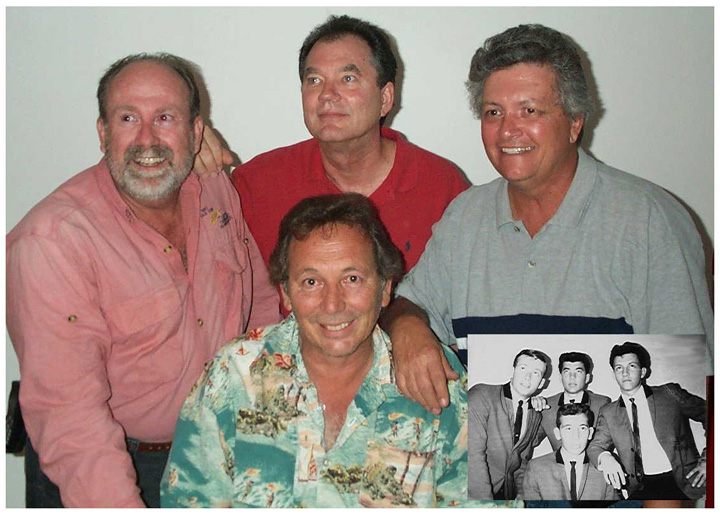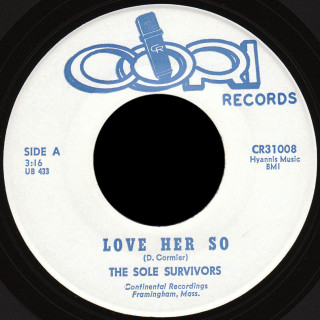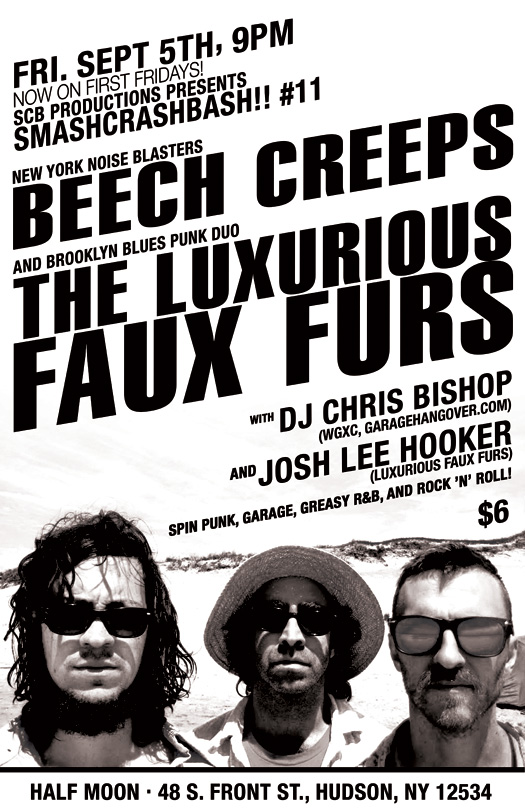 I’ll be spinning 45s at the next SmashCrashBash at the Half Moon in Hudson, NY on Friday, September 5, with bands the Luxurious Faux Furs and the Beech Creeps. It should be an insane night of crude garage rock!
I’ll be spinning 45s at the next SmashCrashBash at the Half Moon in Hudson, NY on Friday, September 5, with bands the Luxurious Faux Furs and the Beech Creeps. It should be an insane night of crude garage rock!
The Mustangs
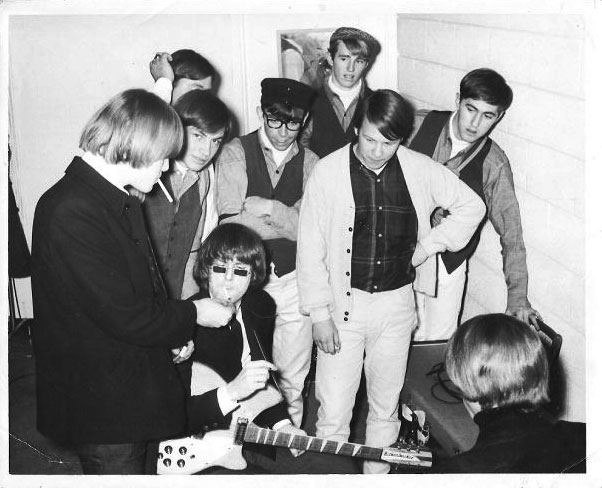
from left: Mike Clark, Larry Hutcherson (partially hidden), Mike Johnstone, Jim McGuinn, Paris Aiken (with glasses), Norm Lawrence, Brad Tinglehoff, Rick Farrar, and Chris Hillman (with back to camera). Photo credited to Bob Scott.
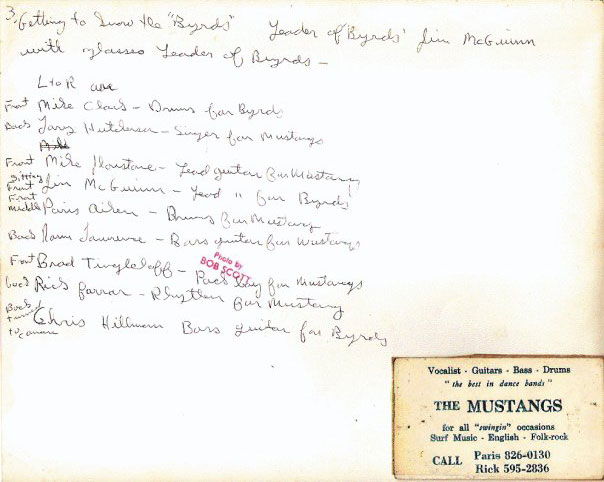
The Mustangs in the photo above consist of:
Larry Hutcherson – vocals
Mike Johnstone – lead guitar
Paris Aiken – drums
Norm Lawrence – bass guitar
Rick Farrar – rhythm guitar
Brad Tinglehoff was the roadie for the group.
According to the Tidewater Virginia Hippies site, other members of the Mustangs included Steve Swenson and Ronnie Hall. I don’t believe this group released any records, and if there were any unreleased recordings, I haven’t heard them.
Mike Johnstone went on to play with Headstone Circus, whose recordings circa 1968 were eventually released by Shadoks. Paris Aiken joined Dennis & the Times, and later played drums with Billy Joe Royal on his recording of “Down in the Boondocks”.
James Mrdutt sent in the photos seen here and reported that Paris passed away on December 24, 2009.
Thank you to Mike Johnstone for correcting the mistakes I made in transcribing the IDs for the photo.
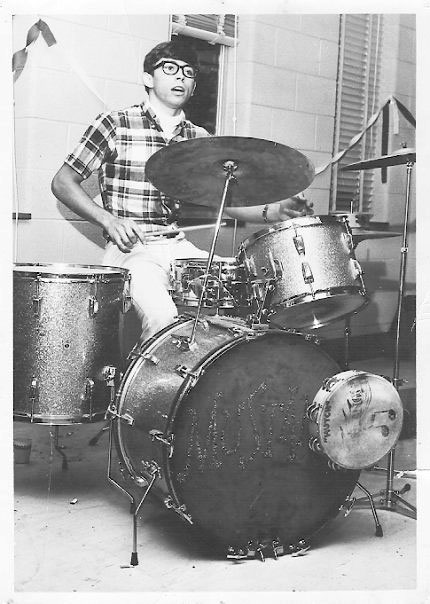
The Gladiators
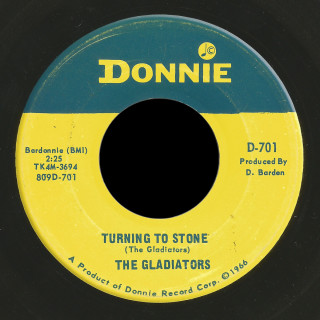 Mickey Ward – keyboards
Mickey Ward – keyboards
Dan Walker – guitar
Glen Mikaland – bass and saxophone
George Neuhoff – drums
This is a 45 I’d been trying to track down for a few years, and finally found a copy through Buckeye Beat, whose website has the full story on this Lorain, Ohio band.
“Turning to Stone” has a sharp fuzz riff and gloomy vocals, with a shift to a bright chorus with tambourine. The flip, “I Need You” comes from a doo wop or vocal group era, it sounds like a different group entirely, though it is well done. “I Need You” is an original by Mickey Ward, “Turning to Stone” was a group original.
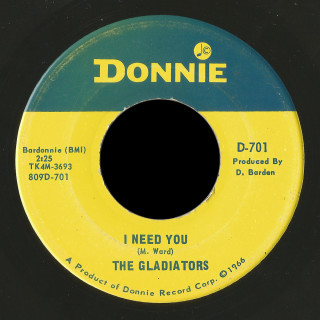 The Gladiators name was only used for this one single from September, 1966 on the Donnie label run by Donnie Barden. The group was actually known as Mickey & the Clean Cuts in live shows and on their first 45 from October, 1965, “Soapy” / “Static Electricity”, also on Donnie and picked up by Wand. I’m not sure why they changed their name for the release of “Turning to Stone”. They had a good sound on that song and I wish they cut more in that style.
The Gladiators name was only used for this one single from September, 1966 on the Donnie label run by Donnie Barden. The group was actually known as Mickey & the Clean Cuts in live shows and on their first 45 from October, 1965, “Soapy” / “Static Electricity”, also on Donnie and picked up by Wand. I’m not sure why they changed their name for the release of “Turning to Stone”. They had a good sound on that song and I wish they cut more in that style.
Anyone have a photo of the group?
The band continued as Mickey & the Clean Cuts, and backed the other two artists on the Donnie label for their releases: Dave Charles’ excellent soul 45 “Ain’t Gonna Cry No More” / “My Love”, and Tillie Wow’s “I Wanna Tell You A Thing Or Two” / “The Sway”, but had no other releases under their own name. Mickey Ward kept the Clean Cuts act going with different members into the ’80s.
Cori Records Discography
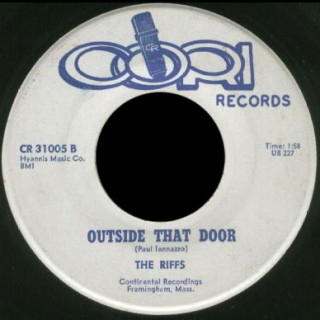 Cori Records was the house label for Continental Recordings studio in Framingham, Massachusetts. I discussed the studio in some depth in an article on the Balladeers, who had the first two 45s released by Continental. Max Waller and I put together this discography of the label. It’s incomplete, especially in regard to the LPs, so if you have any additional information please contact me.
Cori Records was the house label for Continental Recordings studio in Framingham, Massachusetts. I discussed the studio in some depth in an article on the Balladeers, who had the first two 45s released by Continental. Max Waller and I put together this discography of the label. It’s incomplete, especially in regard to the LPs, so if you have any additional information please contact me.
All 45s after the first have matrix codes for Capitol Custom pressings. The first letter of the code refers to the year (T=1965, U=1966, W=1967).
Most publishing is either Hyannis Music Co, BMI or Donna Music Pub. BMI.
On “You’ve Got Me Cryin'” BOSS TODES is written below The Mauve but marked out on all copies I’ve seen. The band had a second 45 as the Boss Todes on the Sound City label in 1967, “Have Certainty” / “Sally the Pollywog”.
45s / 7″ EPs:
E.P. Scroggs CR-0001 – The Balladeers – “Cape Cod (Here We Come) / “Land of the Sea and Sun” (ZTSP-94612/3) (Summer, 1964)
Cori CR-31001 – The Balladeers – “Words I Want To Hear” / “High Flying Bird” (TB 631/2) 8/1965
Cori CR-31002 – The Royals “I’m All Alone” / “The Lady’s Bad” (June 1965)
Cori CR 31003 – The Valkyries “Love You Like I Do” (Curtis) / “Blues For Cookie”(TB 476) 1965
Cori CR 31004 – Al Gay “Soldier’s Last Letter” / “Over and Over”
Cori CR 31005 – The Riffs “Outside That Door” (Paul Iannazzo) / “Holy Ravioli” (UB 276) March 1966
Cori CR 31006 – The Mauve “You’ve Got Me Cryin'” (Ford-Weeks) / “In The Revelation” (Arranged by Eric Sample, UB 238) March 1966
Insegrievious CR 31007 – The End “Bad Night” / “Make Our Love Come Through” (IAM 45-UB-388/6-P1) 1966
Cori CR 31008 – Sole Survivors – “Love Her So” (D. Cormier) / “There Were Times” (R. Pieroni) PS (UB 423, both sides Hyannis Music BMI) 1966
Cori CR 31009 – Notations – “Mr. Ringmaster” (Bruce Chaput) / “I Need No Misery” (Bob Allain)
Cori CR 31010 – C.C & the Chasers “Two And Twenty” / “Hey, Put The Clock Back On The Wall” (WB 144/5) 1967
Cori CR 31011 – Shyres “Where Is Love” (Cox) / “My Girl” (Beckmann) (WB 218/9, both sides Hyannis Music BMI) May 1967
Cori CR 31012 – Jerry Seeco Sextet “That’s All” / “Teach Me Tonight”
Cori CR 31013 – The Kumbaya Singers “To My Brothers” / “Ruben Harte”
Continental Recordings CR-337001: Central Park Zoo – “Help Me Girl” / “Set You Free This Time” / “Louie Louie” / “Monkey Time” / “Painted Black” / “Mustang Sally” (1967)
Cori CR 222: Brownie Macintosh with the Harry Gronki Corale “Rye Whiskey Joe” (Bill Staines) / “The Call” (Gene MacLellan) – 1971
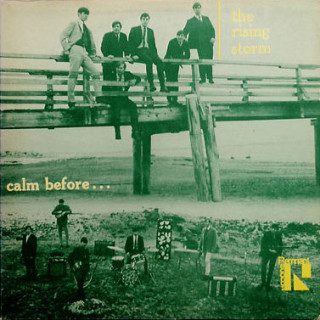 LPs:
LPs:
Remnant Records RBA 3571 – The Rising Storm – Calm Before…
Cori CRLP 31002 – The Passports and the Tabooz – 66 (split LP – Bradford Junior College)
Cori CR 3101 – Bobby Orr – The Two Sides Of Bobby Orr
Cori CR 3111 – Paul Wayne – Live At The Garage
Cori CRLP 31007 – The Passports and the Tabooz – 1968 / Ragged But Right (split LP)
Cori CS 31009 – Endless Knights – Something For You (1971)
Cori CS 31016 – Endless Knights – Back For More (1975)
Cori CS 31017 – Brownie Macintosh – Coastline Brownie (1975)
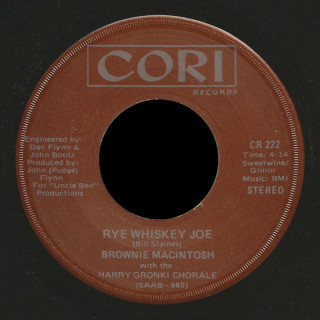 Brownie Macintosh wrote to me about his recordings on Cori:
Brownie Macintosh wrote to me about his recordings on Cori:
I met Dan at probably the most troubled time of my life. I was about 19 and had been kicked out of boarding school a year and a half earlier. I used to drive by the studio on my way from Wayland, MA to Hopkinton to see my then girlfriend. After about a year I got up the courage to knock on the door and Dan was very nice and showed me around. I was absolutely in love with the possibility of working in a studio, and after two or so years, Dan hired me to sing on two jingles … I was hooked.
I did first a single “Rye Whiskey Joe” b/w “The Call” which Dan loved and we had some action on radio, but could not get major Boston airplay, even though we came close. We did the single in 1971. It was exciting as Dan and Pudgie knew a lot of DJs and everyone who came through Continental was forced to listen to it. “Rye Whiskey Joe”, the A-side, was four minutes long, unheard of for an unknown at the time.
I have since produced countless recording sessions, commercial jingles, corporate pieces, records, etc, and written songs for and with The Kingston Trio, The Irish Rovers (which produced my first and only gold record) and many large music publishing companies.
Thank you to Brownie Macintosh, Max Waller, Erik Lindgren, C. Benanti, and Jeffrey Davison for their help with this discography.

The Passports were Linda Moody, Alice Haynsworth, Mimi Walz, Cibby Thomas, Mary Shartle, Carolyn Smith, Ann Detweiler, Elaine Dart, Nancy Byloff, Muff McDonald and Betsy Thurlow. The Tabooz were Margaret Bingham, Susie Grace, Suki Augenblick, Margo Jones, Sarah Miller, Sarah Williams, Muffy Gibson, Liz Thayer, Susan Paul, Bibi Kinney, Debbie Dent, Barb Davis and Robin Boak.
Musically I prefer the Passports side.

Tiger’s Head, Downham, southeast London
The Tiger’s Head was a popular music venue in Downham, Southeast London (near Catford and Bromley) during the 1960s. The Bonzo Dog Doo Dah Band played here many times during their early years. The gigs below are taken from the Southeast London Mercury.
I would welcome any additions or memories of this venue.
3 February 1966 – Bonzo Dog Doo Dah Band (Thursday)
6 February 1966 – Bonzo Dog Doo Dah Band (Sunday)
10 February 1966 – Bonzo Dog Doo Dah Band (Thursday)
13 February 1966 – Bonzo Dog Doo Dah Band (Sunday)
17 February 1966 – Bonzo Dog Doo Dah Band (Thursday)
27 February 1966 – Bonzo Dog Doo Dah Band (Sunday)
3 March 1966 – Bonzo Dog Doo Dah Band (Thursday)
6 March 1966 – Bonzo Dog Doo Dah Band (Sunday)
10 March 1966 – Bonzo Dog Doo Dah Band (Thursday)
13 March 1966 – Bonzo Dog Doo Dah Band (Sunday)
17 March 1966 – Bonzo Dog Doo Dah Band (Thursday)
20 March 1966 – Bonzo Dog Doo Dah Band (Sunday)
27 March 1966 – Bonzo Dog Doo Dah Band (Sunday)
31 March 1966 – Bonzo Dog Doo Dah Band (Thursday)
10 April 1966 – Bonzo Dog Doo Dah Band (Sunday)
14 April 1966 – Bonzo Dog Doo Dah Band (Thursday)
17 April 1966 – Bonzo Dog Doo Dah Band (Sunday)
24 April 1966 – Bonzo Dog Doo Dah Band (Sunday)
29 April 1966 – The Anzaks (Friday)
1 May 1966 – Bonzo Dog Doo Dah Band (Sunday)
7 May 1966 – Bill Seney & His Modern Jazz Band (Saturday)
8 May 1966 – Bonzo Dog Doo Dah Band (Sunday)
15 May 1966 – Bonzo Dog Doo Dah Band (Sunday)
22 May 1966 – Bonzo Dog Doo Dah Band (Sunday)
29 May 1966 – Bonzo Dog Doo Dah Band (Sunday)
5 June 1966 – Bonzo Dog Doo Dah Band (Sunday)
12 June 1966 – Bonzo Dog Doo Dah Band (Sunday)
19 June 1966 – Bonzo Dog Doo Dah Band (Sunday)
26 June 1966 – Bonzo Dog Doo Dah Band (Sunday)
3 July 1966 – Bonzo Dog Doo Dah Band (Sunday)
10 July 1966 – Bonzo Dog Doo Dah Band (Sunday)
17 July 1966 – Bonzo Dog Doo Dah Band (Sunday)
24 July 1966 – Bonzo Dog Doo Dah Band (Sunday)
30 July 1966 – Bonzo Dog Doo Dah Band (Saturday)
7 August 1966 – Bonzo Dog Doo Dah Band (Sunday)
21 October 1966 – The Overlanders (Friday)
28 October 1966 – The Loose Ends (Friday)
11 November 1966 – Gary Farr & The T-Bones (Friday)
18 November 1966 – The Shotgun Express (Friday) (Fabulous 208)
24 November 1966 – John Mayall’s Bluesbreakers (Thursday)
2 December 1966 – The Symbols (Friday)
16 December 1966 – The Riot Squad (Friday)
23 December 1966 – The Shevelles (Friday)
30 December 1966 – The Downliners Sect (Friday)

6 January 1967 – The New Loose Ends (Friday)
13 January 1967 – The Amboy Dukes (Friday)
25 January 1967 – Bonzo Dog Doo Dah Band (Wednesday)
3 February 1967 – The Herd (Friday) (Fabulous 208)
10 February 1967 – The Shevelles (Friday)
17 February 1967 – The Shotgun Express (Friday)
2 March 1967 – The Gass (Thursday)
8 March 1967 – Bonzo Dog Doo Dah Band (Wednesday)
31 March 1967 – Tony Rivers & The Castaways (Friday)
14 April 1967 – Coloured Raisins and Honey Darling (Friday)
21 April 1967 – The James Royal Set (Friday)
 28 April 1967 – The New Mojo Band (Friday)
28 April 1967 – The New Mojo Band (Friday)
5 May 1967 – The Spectrum (Friday) (says Bellingham so could be King Alfred’s instead)
12 May 1967 – Marmalade (Friday)
19 May 1967 – Davey Sands & The Essex (Friday)
26 May 1967 – The Spectrum (Friday)
2 June 1967 – St James Infirmary (Friday)
9 June 1967 – The Spectrum (Friday)
16 June 1967 – Linda Layne & The Sin (Friday)
23 June 1967 – Freddie Fingers & The Upper Hand (Friday)
30 June 1967 – Tony Rivers & The Castaways (Friday)
19 July 1967 – Bonzo Dog Doo Dah Band (Fabulous 208) (Wednesday)
28 July 1967 – The Coloured Raisins (Friday)
18 August 1967 – The Coloured Raisins (Friday)
12 January 1968 – The Shell Shock Show (Friday)
26 January 1968 – The Love Affair (Friday)
2 February 1968 – The Delroy Williams Show (Friday)

9 February 1968 – Hamilton’s Movements (Friday)
16 February 1968 – The Coloured Raisins (Friday)

8 March 1968 – Cymbalines (Friday)

15 March 1968 – The Coloured Raisins (Friday)
12 April 1968 – The Riot Squad (Friday)
19 April 1968 – The Good Time Band (Friday)
26 April 1968 – Sugar Simone & The Programme (Friday)
17 May 1968 – Joyce Bond Revue (Friday)
14 June 1968 – The Epics (Friday)
21 June 1968 – Hopscotch (Friday)

28 June 1968 – Moon’s Train (Friday)
5 July 1968 – The Joyce Bond Revue (Friday)
12 July 1968 – The Coloured Raisins (Friday)
13 July 1968 – The Wild Angels (Saturday)
2 August 1968 – 1958 Rock Show with Freddie Fingers (Friday)
16 August 1968 – The Coloured Raisins (Friday)
23 August 1968 – Tony Rivers (& Harmony Grass) (Friday)
30 August 1968 – Episode Six (Friday)
6 September 1968 – The Coloured Raisins (Friday)
13 September 1968 – Hopscotch (Friday)
20 September 1968 – The Joyce Bond Revue (Friday)
11 October 1968 – The Epics (Friday)
18 October 1968 – Gene Latter (Friday)
1 November 1968 – Tony Rivers (& Harmony Grass) (Friday)
15 November 1968 – The Coloured Raisins (Friday)
22 November 1968 – Hopscotch (Friday)
20 December 1968 – The Coloured Raisins (Friday)
24 December 1968 – The Colts (Tuesday)
31 December 1968 – Night Love (Tuesday)
3 January 1969 – The Symbols (Friday)
10 January 1969 – The Coloured Raisins (Friday)
17 January 1969 – The Coloured Raisins (Friday)
24 January 1969 – Episode Six (Friday)
6 October 1969 – The Courtelles (Monday)
The Private Collection
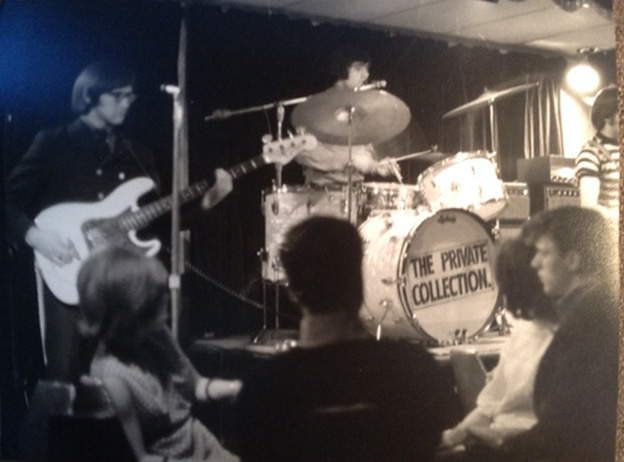
Richard Kuzniak sent me the photo above of the Private Collection, a band he used to see weekly at the El Patio nightclub in Yorkville. Ivan Amirault wrote to me with info on the band and the clippings seen below:
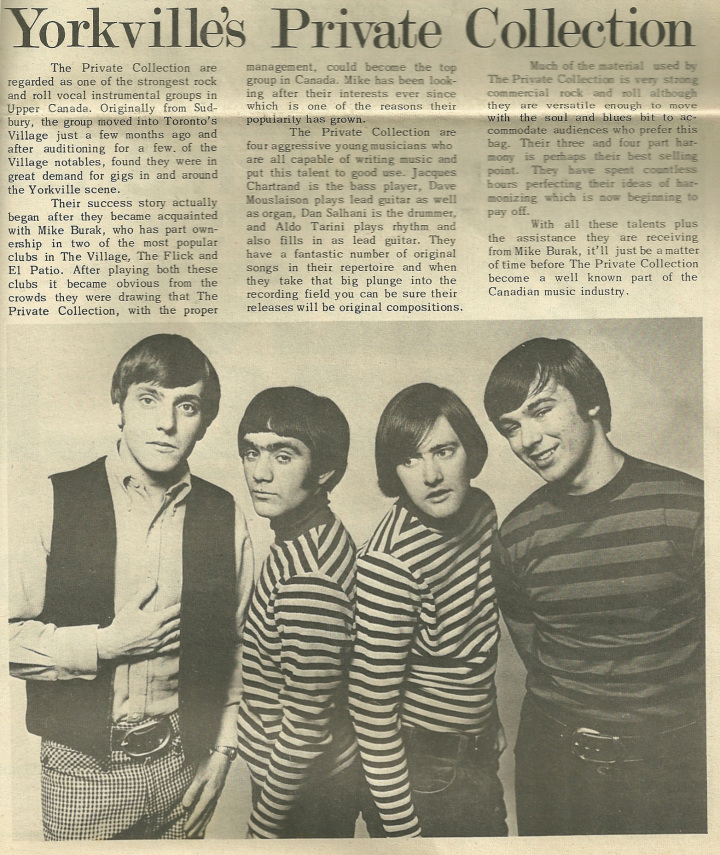
from left: Aldo Tarini, Dan Salhani, Jacques Chartrand, and Dave Mouslaison
Dave Mouslaison – lead guitar, organ, vocals
Aldo Tarini – rhythm and lead guitar, vocals
Jacques Chartrand – bass, vocals
Dan Salhani – drums, vocals
The Private Collection were from Sudbury but relocated to Toronto. They performed regularly at The Flick and El Patio, managed by Mike Burak, a part-owner of the clubs. RPM magazine reported on October 2, 1967 that the band had just done a session at Sound Canada with Rick Shorter producing.
Ivan wrote to me “They were a very good harmony band. Dave Moulaison was later in Aaron Space who recorded a great LP on Warner Brothers only in Canada.
“Jocko Chartrand was also in Buckstone Hardware who had a 45 on Apex here in Canada. It also came with a picture sleeve. The core of that band was from North Bay, about 1 1/2 hours east of Sudbury. Joko also made a couple of fairly good solo singer/songwriter type LPs in the 80s.”
Ivan has over two hours of home recordings of the band, plus a few songs from their never-released studio sessions.
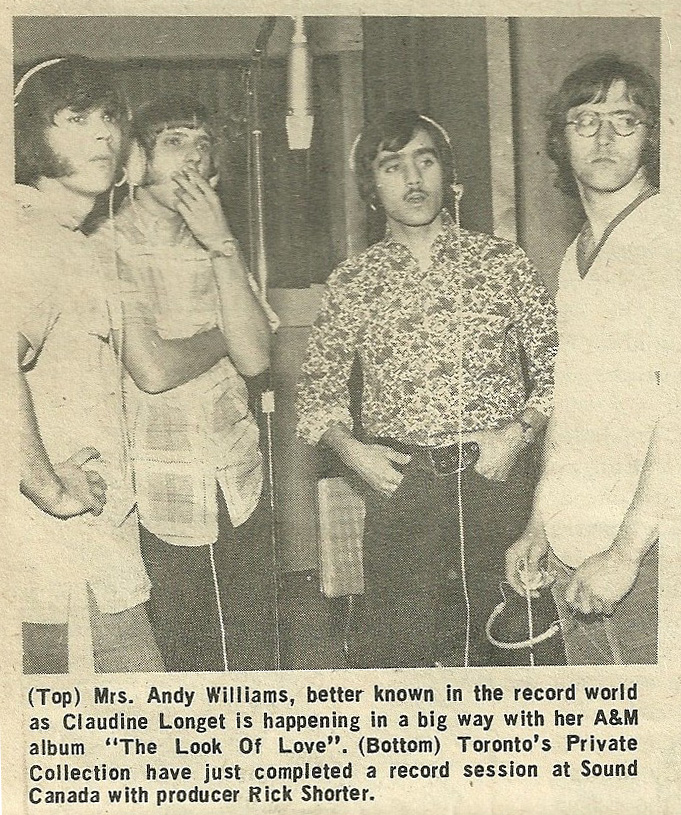
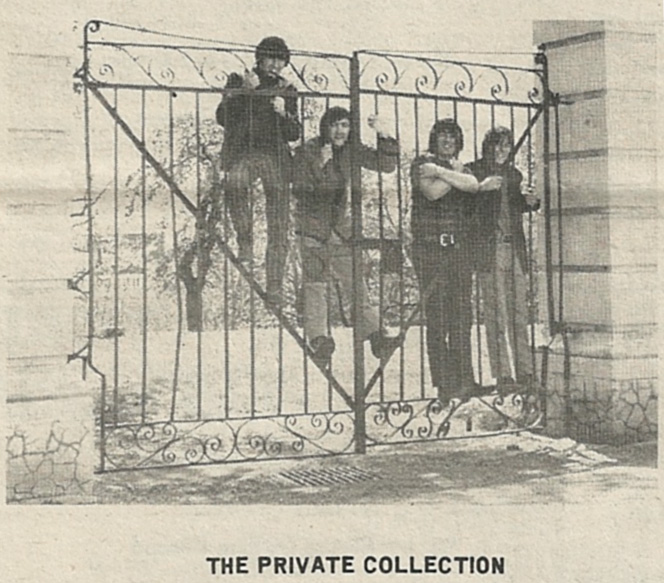
Geno Washington & The Ram Jam Band 1967-1968
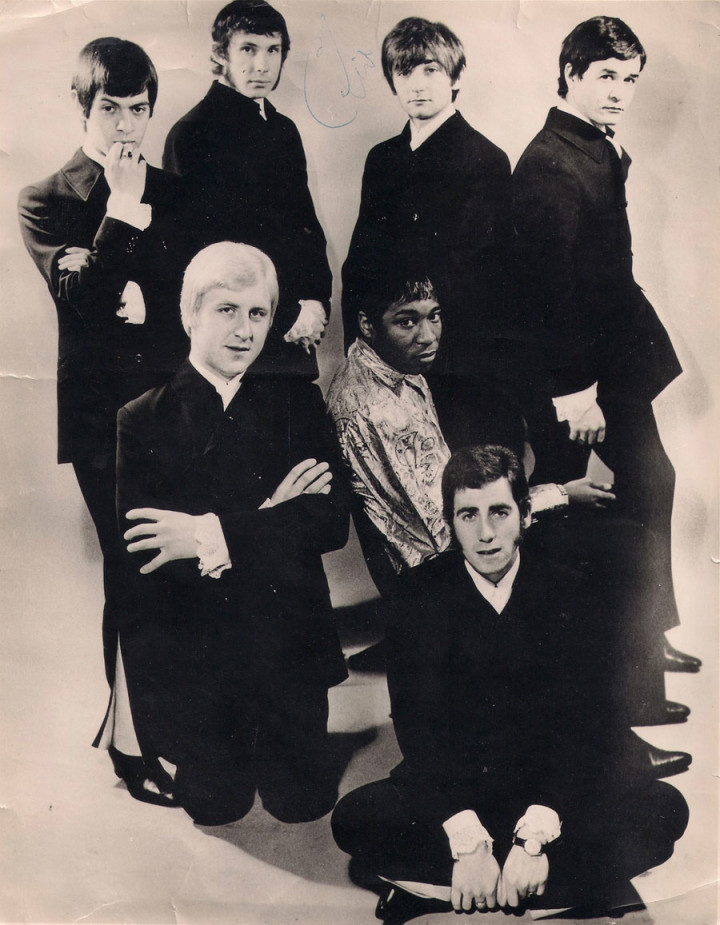
Clockwise from front, Peter Carney, Geno Washington, Hans Herbert, John Culley, Dave Greenslade, Clive Burrows and Lionel Kingham (photo from Buddy Beadle).
Geno Washington & The Ram Jam Band
(April 1967-April 1968)
Geno Washington – lead vocals
John ‘Silkie’ Culley – lead guitar
Dave Greenslade – organ (replaced John Carroll who played a few weeks)
Peter Carney – bass
Lionel ‘Rocky’ Kingham – tenor saxophone
Clive ‘Hercules’ Burrows – baritone saxophone
Hans Herbert – drums
Melody Maker announced that three (of the original) members (Pete Gage, Geoff Pullum and Herb Prestidge) had left in mid-April 1967 and Geno Washington would be replacing them the same week. The revised line up (deputy musicians alongside surviving members) was due to play its debut on 19 April (Wednesday).
NME also noted that three original members had left the week ending 22 April. It reported that Geno Washington had taken on deputy musicians until permanent replacements could be found as commitments would not be interrupted.
Guitarist John Culley confirmed from his diary that he played his debut on 26 April (with John Carroll on organ) after auditioning at the Ram Jam in Brixton a day or two beforehand (24 April is the most plausible date) so deputy musicians were definitely used in the interim.

The personnel changes were subsequently announced in South East London Mercury on 18 May 1967 (page 2).
NME announced the Dave Greenslade line-up above in the week ending 6 May, so it seems that John Carroll did play a few weeks before Greenslade joined after honouring his commitments with Chris Farlowe & The Thunderbirds.
Keyboard player John Carroll knew bass player Peter Carney from The Flexmen and The London Beats during 1963-1965. He also briefly played with Carney in Tony Knight’s Chessmen in 1966 before joining The New Pirates in February 1967. Carroll had commitments with The Flower Pot Men and later went on to play with Herbie Goins & The Night-Timers and The Flirtations on Stevie Wonder’s UK tour.
Guitarist John Culley had formed The Hi-Grades in spring 1962 alongside guitarist Glen Desmier, bass player Mike Watson drummer Phil Wainman and others. After backing singer Michael Holliday in Jersey the following summer (as Mike Twain & The Hi-Grades), the musicians moved to Sweden in June 1964 and recorded for Sonet. They also backed other artists on recordings for the label. In 1965, Tony Walter replaced Phil Wainman on drums and the musicians toured Denmark, briefly working as The Dynamiters and backing singer Swedish Jerry Williams before Culley returned to the UK in late 1965.
Culley next moved to Paris to work with French singer Ronnie Bird until auditioning for Geno Washington in April 1967. Peter Carney brought his old friend Pete Ross from The Flexmen along to the Ram Jam audition but John Culley got the job.
Drummer Hans Herbert, who’d played with Peter Carney and John Carroll in The Flexmen, had gone on to work with The Just Four and The Guests during 1965-1966 before playing with The All Night Workers from October 1966.
Keyboard player Dave Greenslade was a longstanding member of Chris Farlowe & The Thunderbirds (who’d gigged with the original Ram Jam Band on numerous occasions), having briefly worked with Clive Burrows in the Wes Minister Five in 1964.
After Greenslade joined, the new Ram Jam Band (with a session bass player, possibly Tony Reeves) recorded and released two singles – “She Shot a Hole In My Soul” c/w “I’ve Been Hurt By Love” (Piccadilly 7N 35392), released in June 1967; and “Different Strokes” c/w “You Got Me Hummin’” (Pye 7N 17425), released in December 1967. For the “Different Strokes” session, noted session player Harry Stoneham arranged the track and added keyboards alongside Greenslade.
With Peter Carney on bass, they also cut the remainder of the tracks on the second LP, Hipsters, Flipsters, Finger-Poppin’ Daddies! (Piccadilly NPL/NSPL 38032), which was released in September 1967 and peaked at #8 in the UK charts. Later that year, the band recorded a studio album, Shake a Tail Feather Baby! (Piccadilly NPL/NSPL 38029), which was issued in January 1968.
“Different Strokes” and “You Got Me Hummin’” also appeared on a second EP, “Different Strokes” (Pye NEP 24293), which also included the tracks “I’m Your Puppet” and “Use Me”. The former was cut earlier in the year by the Pete Gage formation.
Selected gigs:
19 April 1967 – College of Commerce, Hull, Humberside with Tony Rivers & The Castaways, The Amboy Dukes, The Locomotion and The Jamm

21 April 1967 – Boulevard Club, Tadcaster, North Yorkshire and Crystal Ballroom, Castleford, West Yorkshire
22 April 1967 – Twisted Wheel, Manchester
23 April 1967 – Ricky Tick, Plaza, Newbury, Berkshire
(Please note: above gigs may not have happened but if they did, they were with deputy musicians)
24/25 April – Auditions at Ram Jam, Brixton, London bring in John Carroll and John Culley
26 April 1967 – Top Rank, Croydon, London with Davey Sands & The Essex (Carroll and Culley’s debut)
27 April 1967 – Locarno Ballroom, Swindon, Wiltshire
27 April 1967 – Plaza Ballroom, Old Hill, West Midlands (clashes with confirmed gig above and not in John Culley’s diary so very unlikely)
28 April 1967 – Chelmsford Corn Exchange, Chelmsford, Essex (not in John Culley’s diary)
28 April 1967 – Shoreline, Bognor Regis, West Sussex
29 April 1967 – Floral Hall, Southport, Lancashire

30 April 1967 – Beau Brummel Club, Nantwich, Cheshire
1 May 1967 – Watford Round Table, Watford Top Rank Suite, Watford, Hertfordshire with The Amboy Dukes
2 May 1967 – High Wycombe Town Hall, High Wycombe, Buckinghamshire
4 May 1967 – Bowes Lyon House, Stevenage, Hertfordshire
5 May 1967 – Southampton Guildhall, Southampton, Hants. (David Else also has them playing Newbury Ricky Tick on this date)
6 May 1967 – Chelmsford Corn Exchange, Chelmsford, Essex
7 May 1967 – NME Poll Winners’ Show, Empire Pool, Wembley, London with Dave Dee, Dozy, Beaky, Mick and Titch, Cream, Dusty Springfield, Georgie Fame & The Blue Flames, The Beach Boys, Paul Jones, Lulu, The Move, The Small Faces, The Spencer Davis Group, The Alan Price Set, Cat Stevens, The Troggs and others
16 May – Recording at Pye
17 May 1967 – Top Rank, Doncaster, South Yorkshire (also TV appearance)
18 May 1967 – Locarno Ballroom, Coventry, West Midlands
19 May 1967 – Starlite Ballroom, Greenford, London
20 May 1967 – Toft’s, Folkestone, Kent
21 May 1967 – Ricky Tick, Plaza, Newbury, Berkshire
22 May 1967 – California Ballroom, Dunstable, Bedfordshire with The Penny Blacks
25 May 1967 – Recording at Pye

26 May 1967 – Pavilion Ballroom, Weymouth, Dorset with Palmer James and The Package Deal
27 May 1967 – Winter Gardens Pavilion, Weston-Super-Mare, Somerset
28 May 1967 – Ram Jam, Brixton, London with The Hunky Chunk Band
29 May 1967 – Tulip Bulp Auction Hall, Spalding, Lincolnshire with Jimi Hendrix Experience, Cream, The Move, Zoot Money and Pink Floyd
31 May – Recording at Pye
1 June 1967 – Salisbury City Hall, Salisbury, Wiltshire with Combustion
2 June 1967 – Ricky Tick, Hounslow, London
3 June 1967 – Morley Town Hall, Morley, West Yorkshire with Bobby Johnson & The Atoms
4 June 1967 – Agincourt Ballroom, Camberley, Surrey
6 June 1967 – Britannia Ballroom, Nottingham, Nottinghamshire
10 June 1967 – Carlton Ballroom, Erdington, West Midlands
10 June 1967 – Gaiety Ballroom, Ramsey, Cambridgeshire (missing from John Culley’s diary so needs confirmation)
11 June 1967 – Redcar Jazz Club, Coatham Hotel, Redcar, North Yorkshire
13 June 1967 – Caius College, Cambridge University, Cambridge, Cambridgeshire with Chris Farlowe & The Thunderbirds

16 June 1967 – Birdcage, Eastney, Hampshire
17 June 1967 – Oxford University, Oxford, Oxfordshire
18 June 1967 – Britannia Pier, Great Yarmouth, Norfolk with The Nite People, Ferris Wheel and Neil Diamond
26 June 1967 – St Luke’s College, Exeter University, Exeter, Devon
27 June 1967 – Queen’s Hall, Barnstaple, Devon

29 June 1967 – Scotch Club, Torquay, Devon
30 June 1967 – St George’s Hall, Exeter, Devon
1 July 1967 – Ritz Ballroom, Bournemouth, Dorset with Minor Portion
2 July 1967 – Khyber Club, Taunton, Somerset
3 July 1967 – Bath Pavilion, Bath, Somerset
4 July 1967 – Winter Gardens, Malvern, Worcestershire
6 July 1967 – Flamingo Ballroom, Redruth, Cornwall with Julian Covey Machine (held at Flamingo Ballroom)
9 July 1967 – Ram Jam, Brixton, London

11 July 1967 – Torquay Town Hall, Torquay, Devon
11 July 1967 – Locarno Ballroom, Basildon, Essex (missing from John Culley’s diary and unlikely as above date confirmed)
12 July 1967 – Supreme Ballroom, Ramsgate, Kent (missing from John Culley’s diary so not clear if this happened)
12 July 1967 – Bal Tabarin, Downham, London
13 July 1967 – Recorded for Top of the Pops (according to John Culley’s diary)
(Note: This may have been same show that was aired on 1 September and also included The Action, Pinkerton’s Assorted Colours and Matt Munroe)
15 July 1967 – Twisted Wheel, Manchester
17 July 1967 – Locarno Ballroom, Portsmouth, Hants (missing from John Culley’s diary so may not have happened)
18 July 1967 – Marquee, Wardour Street, Soho, London with The Amboy Dukes
19 July 1967 – Ram Jam, Brixton, London (recorded promo video at Battersea Park earlier in the day)
21 July 1967 – Casino Club, Burnley, Lancashire with Sisters of Idle Dreams
22 July 1967 – Floral Hall, Southport, Lancashire
24 July 1967 – Recorded for BBC in Manchester (Pop North)
25 July 1967 – Left for Scottish tour that lasted until 29 July

28 July 1967 – Ballerina Ballroom, Nairn, Scotland with The Copycats
29 July 1967 – The Beach, Aberdeen, Scotland (missing from John Culley’s diary so needs confirmation)
31 July 1967 – Silver Blades, Bradford, West Yorkshire (missing from John Culley’s diary so needs confirmation)
1 August 1967 – Sherwood Rooms, Nottingham with Shades of Gray (missing from John Culley’s diary)
3 August 1967 – Locarno Ballroom, Streatham, London
5 August 1967 – New Cornish Riveria, St Austell, Cornwall with The Harlequins
7 August 1967 – Birmingham Roller Rink, Birmingham (also BBC recordings Monday Monday)
8 August 1967 – Sherwood Rooms, Nottingham, Nottinghamshire
10 August 1967 – Locarno, Bristol, Avon
11 August 1967 – Locarno, Basildon, Essex
16 August 1967 – Seagull Ballroom, Ryde Pier Head, Isle of Wight

17 August 1967 – Locarno Ballroom, Portsmouth, Hampshire with Jack & The Jacobites
18 August 1967 – Flew to Spain
19 August 1967 – Tiffany’s Ballroom, Barcelona, Spain (also play gigs at Platja D’aro)
22 August 1967 – Spinning Disc, Leeds, West Yorkshire
24 August 1967 – Locarno Ballroom, Coventry, West Midlands
25 August 1967 – Gaiety, Grimsby, South Yorkshire
26 August 1967 – Ram Jam, Brixton, London
28 August 1967 – Hastings Festival, Hastings, East Sussex with The Kinks, Dave Dee, Dozy, Beaky, Mick & Tich, The Crazy World of Arthur Brown, Robb Storme & The Whispers, Winston’s Fumbs and Hip Hooray Band
30 August 1967 – Locarno, Stevenage, Hertfordshire

31 August 1967 – Pavilion, Southampton, Hants
1 September 1967 – Carlton Ballroom, Erdington, West Midlands (missing from John Culley’s diary and clashes with Hayes gig below which is confirmed but it was advertised)

1 September 1967 – Adelphi Ballroom, West Bromwich, West Midlands (not in John Culley’s diary and clashes with Hayes gig below which is confirmed but it was advertised)
1 September 1967 – Botwell Community Centre, Hayes, London
4 September 1967 – Queen’s Ballroom, Wolverhampton, West Midlands with Robert Plant & The Band of Joy
5 September 1967 – BBC Saturday Club appearance
7 September 1967 – Skyline Ballroom, Hull, Humberside
8 September 1967 – Boulevard Club, Tadcaster, North Yorkshire and then Crystal Ballroom (aka the Boogaloo Discotheque), Castleford, West Yorkshire
9 September 1967 – Floral Hall, Southport, Lancashire
12 September 1967 – Palais, Ilford, Essex
13 September 1967 – Orchid Ballroom, Purley, London (short holiday after this)
28 September 1967 – Assembly Hall, Worthing, West Sussex
30 September 1967 – Band flies to Copenhagen for short Scandinavian tour, sharing some dates with John Mayall’s Bluesbreakers and Frank Zappa’s Mothers of Invention
30 September 1967 – ‘Love Out’, Brondby Pop Club, Brondby, Denmark with John Mayall’s Bluesbreakers, Hurdy Gurdy and R&B Section
3-4 October 1967 – Star Club, Copenhagen, Denmark
7 October 1967 – Idrotthuset, Orebro, Sweden with John Mayall’s Bluesbreakers, Blues Quality and The Quints
8 October 1967 – Jernvallen, Sandviken, Sweden with John Mayall’s Bluesbreakers and Two Good Reasons (On this day also billed to play Grantham Drill Hall with Broodly Hoo and Legay but didn’t appear)
10 October 1967 – Konserthuset, Stockholm, Sweden with John Mayall’s Bluesbreakers and The Defenders
13 October 1967 – Tottenham Royal, Tottenham, London (missing from John Culley’s diary so may not have happened)
14 October 1967 – Flowerpot Club, Digbeth, Birmingham, West Midlands with The Sea Cruisers (missing from John Culley’s diary so needs confirmation)

15 October 1967 – Civic Centre, Corby, Northamptonshire (missing from John Culley’s diary so needs confirmation)

16 October 1967 – Silver Blades Ice Rink, Bradford, West Yorkshire (missing from John Culley’s diary so may not have happened)
17 October 1967 – Marquee, Wardour Street, Soho, London with The Amboy Dukes
21 October 1967 – Matlock Bath, Matlock, Derbyshire with Bread & Butter Band, Thorndyke’s Mordekai’s Imagination (missing from John Culley’s diary so needs confirmation)
22 October 1967 – Starlight Ballroom, Crawley, West Sussex (missing from John Culley’s diary so needs confirmation)

27 October 1967 – Skyline Ballroom, Hull with The Roll Movement, Richard G Simpson Band and The Peighton Checks (missing from John Culley’s diary so needs confirmation)
28 October 1967 – Dreamland Ballroom, Margate, Kent (missing from John Culley’s diary so may not have happened)
29 October 1967 – Starlite Ballroom, Greenford, London with The All-Nite Workers
4 November 1967 – Adelphi Ballroom, West Bromwich, West Midlands with Johnny Neale & The Starliners (missing from John Culley’s diary)
4 November 1967 – Carlton Ballroom, Erdington, West Midlands (missing from John Culley’s diary)

5 November 1967 – Plaza, Huddersfield, West Yorkshire with The Rats (missing from John Culley’s diary)

6 November 1967 – Locarno Ballroom, Blackpool, Lancashire (missing from John Culley’s diary)
15 November 1967 – St Andrew’s Hall, Norwich, Norfolk with Alex Wilson Sect and Rubber Band (missing from John Culley’s diary)
16 November 1967 – Birdcage, Harlow, Essex (missing from John Culley’s diary so needs confirmation)
17 November 1967 – Big C Club, Farnborough, Hants (missing from John Culley’s diary so needs confirmation)
18 November 1967 – Twisted Wheel, Manchester
21 November 1967 – Greasboro’ Social Club, Doncaster, South Yorkshire and Kettlethorpe Working Men’s Club, Wakefield, West Yorkshire (missing from John Culley’s diary so needs confirmation)
27 November 1967 – Queen’s Ballroom, Wolverhampton, West Midlands with The Probe (missing from John Culley’s diary so needs confirmation)
28 November 1967 – Bag O’Nails, Kingley Street, Soho, London (missing from John Culley’s diary so needs confirmation)
2 December 1967 – Imperial Ballroom, Nelson, Lancashire with The 4th Coming and The Acme Music Co
26 December 1967 – Roller Rink, Birmingham, West Midlands (missing from John Culley’s diary so needs confirmation)

30 December 1967 – Starlight Room, Boston, Lincolnshire with Ebony Keys, The Lost and Ray Bones
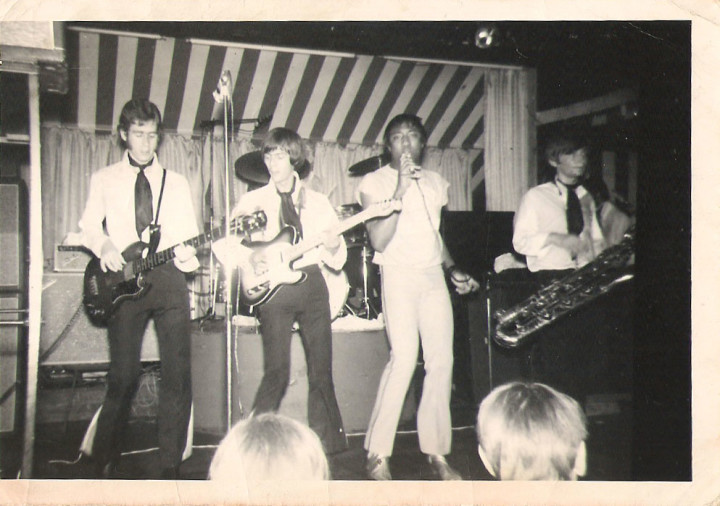
Left to right: Peter Carney, John Culley, Geno Washington and Clive Burrows (photo from Peter Carney).
1 January 1968 – Sherwood Arms, Nottingham, Nottinghamshire
4 January 1968 – Locarno Ballroom, Portsmouth, Hants
5 January 1968 – Royal Ballroom, Tottenham, London
7 January 1968 – Starlight Ballroom, Crawley, West Sussex
9 January 1968 – Bluesology Festival, Chateau Impney, Droitwich Spa, Worcestershire with John Mayall’s Bluesbreakers, Joe Cocker, Cliff Bennett & The Rebel Rousers and Duster Bennett
9 January 1968 – Marquee, Wardour Street, Soho, London with Ferris Wheel
10 January 1968 – Pavilion, Southampton, Hants
11 January 1968 – Locarno Ballroom, Streatham, London
13 January 1968 – Floral Hall, Southport, Lancashire
19 January 1968 – Queen’s Hall, Burslem, Staffordshire with The Iveys (some sources have Marmalade and The Peeps)
20 January 1968 – Twisted Wheel, Manchester
28 January 1968 – Club Cedar, Birmingham with Georgie Fame and The Cedar Set
30 January 1968 – Palais, Ilford, Kent
31 January 1968 – Locarno, Stevenage, Hertfordshire
2 February 1968 – New Central Pier, Morecombe, Lancashire
3 February 1968 – Civic Hall, Nantwich, Cheshire with The Executives
5 February 1968 – The Howard Platt Discotheque Show, Jazz and Blues Festival, Norwich, Norfolk with The Kinks and Freddie Mack & The Mack Sound
10 February 1968 – Devonshire House, Exeter University, Exeter, Devon

12 February 1968 – Bluesville ’68, St Matthew’s Baths, Ipswich, Suffolk with The Track

15 February 1968 – Zodiac Club, Eden Park Hotel, Beckenham, London (replacing Georgie Fame)
16 February 1968 – Top Rank Suite, Swansea, Wales with The Tremeloes and Cliff Bennett & The Rebel Rousers
17 February 1968 – Corn Exchange, Chelmsford, Essex with Simon K & The Meantimers
24 February 1968 – Dreamland Ballroom, Margate, Kent with The Dykas
25 February 1968 – New Regis Club, Bognor Regis, West Sussex
28 February 1968 – Bluesville ’68 Club, St Matthew’s Baths, Ipswich, Suffolk
1 March 1968 – Mad Hatters Ball, Albert Hall, London with John Mayall’s Bluesbreakers and others (cancelled)
2 March 1968 – Winter Gardens, Weston-Super-Mare, Somerset
3 March 1968 – Starlight Ballroom, Crawley, West Sussex

8 March 1968 – Club Rado, Belfast, Northern Ireland with The Few
9 March 1968 – Belfast University Students’ Union, Belfast, Northern Ireland with Taste
11 March 1968 – Locarno Ballroom, Glasgow

15 March 1968 – Clockwork Orange, Chester, Cheshire with The Soul Station (or might be The Uncertainty)
16 March 1968 – Cliffs Pavilion, Southend-on-Sea, Essex with support
17 March 1968 – Hotel Leofric, Coventry, West Midlands
18 March 1968 – Queen’s Ballroom, Wolverhampton, West Midlands with The System
22 March 1968 – Big C Club, Farnborough, Hants
23 March 1968 – Twisted Wheel, Manchester

6 April 1968 – Glen Ballroom, Llanelli, south Wales
9 April 1968 – Pantiles, Bagshot, Surrey
11 April 1968 – Eden Park Hotel, Beckenham, London
12 April 1968 – Imperial Ballroom, Nelson, Lancashire
13 April 1968 – Sports Stadium, Bracknell, Berkshire
19 April 1968 – Clockwork Orange, Chester, Cheshire with Granny’s Intentions
20 April 1968 – Glen Ballroom, Llanelli, Wales
Geno Washington & The Ram Jam Band
(April 1968-August 1968)
Geno Washington – lead vocals
Dave Greenslade – organ
John ‘Silkie’ Culley – lead guitar
Peter Carney – bass
Lionel ‘Rocky’ Kingham – tenor saxophone
Pat Higgs – trumpet
Hans Herbert – drums
Clive Burrows left around April 1968 and the band took on trumpet player Pat Higgs, a former member of Elton John’s mid-1960s band, Bluesology and then a brief member of Hamilton & The Hamilton Movement.
This version of the band was responsible for a lone single, “I Can’t Quit Her” c/w Carney and Culley’s “Put Out The Fire Baby” (Pye 7N 17570), which was released in July 1968.
Geno Washington’s band also recorded a new live album Live! – Running Wild (Pye NPL/NSPL 18219) recorded at the Casino Ballroom, Bolton, Lancashire on 9 August 1968 before personnel changes took place.
NME reported in the week ending 17 August that Geno Washington had split from Rik Gunnell’s agency and briefly gone with Mike Rispoli.
Selected gigs:
27 April 1968 – Plaza Ballroom, Handsworth, West Midlands
28 April 1968 – Wake Arms, Epping, Essex
2 May 1968 – ‘Star Club’, Agincourt, Camberley, Surrey with The Late

4 May 1968 – Leas Cliff Hall, Folkestone, Kent with The Section and Square One
9 May 1968 – The Matrix, Coventry, West Midlands with The Magazine and The Square (or Skin Deep)
10 May 1968 – George Ballroom, Hinckley, Leicestershire with The Magazine and The Square
11 May 1968 – Bouton Rouge, Paris, France (filmed for French TV – this might be the broadcast date). According to Birmingham Evening Mail, they played The Swan, Yardley, West Midlands with The Magazine on this day
16 May 1968 – Black Prince, Bexley, London
17 May 1968 – Mayfair, Newcastle upon Tyne, Tyne & Wear
18 May 1968 – Pavilion Gardens, Buxton, Derbyshire with Bags Grove
19 May 1968 – Oasis Club, Wolverhampton, West Midlands with support
22 May 1968 – Top Rank, Reading, Berkshire
23 May 1968 – Civic Hall, Guildford, Surrey with The Pyramids
24 May 1968 – Town Hall, Walsall, West Midlands
24 May 1968 – George Ballroom, Hinckley, Leicestershire with The Magazine and The Square (need to confirm)
25 May 1968 – Civic Hall, Nantwich, Cheshire with Jaytree Organisation

26 May 1968 – Oasis Club, Wolverhampton, West Midlands with The Staffords
31 May 1968 – Winter Gardens, Blackpool, Lancashire
2 June 1968 – Sherwood Rooms, Nottingham, Nottinghamshire with The Isley Brothers, James and Bobby Purify, Jo Jo Cook & The Rackett and Fascination
6 June 1968 – Locarno Ballroom, Portsmouth, Hants

8 June 1968 – Civic Hall, Dunstable, Bedfordshire with Goodtime Band

12 June 1968 – Locarno, Stevenage, Herts
13 June 1968 – Locarno Ballroom, Coventry, West Midlands
14 June 1968 – Club A Go Go, Newcastle upon Tyne, Tyne & Wear

21 June 1968 – Midsummer Nights Dream, Burton Constable, near Hull with Geno Washington & The Ram Jam Band, Marmalade, Family, Spooky Tooth, Tramline, Savoy Brown Blues Band, Elmer Gantry’s Velvet Opera, Baron Richtofen’s Rock ‘N’ Roll Circus, CJ Morris and The Reaction
27 June 1968 – Liberal Hall, Yeovil, Somerset with The Emotions
30 June 1968 – Black Prince Hotel, Bexley, London
1 July 1968 – Chesford Grange, Kenilworth, Warwickshire with The Traction
4 July 1968 – Dreamland Ballroom, Margate, Kent with The Iveys
5 July 1968 – Kursaal Ballroom, Southend-on-Sea, Essex
6 July 1968 – Woburn Music Festival, Woburn, Bedfordshire with Jimi Hendrix Experience, T-Rex, Family, New Formula and Little Women
12 July 1968 – Locarno, Basildon, Essex
14 July 1968 – Birmingham Top Rank Suite, Birmingham, West Midlands
15 July 1968 – Radio One’s David Symonds Show
19 July 1968 – Romanos, Belfast, Northern Ireland with The Dixies
20 July 1968 – New Arcadia, Bray, Republic of Ireland with The Ravens
21 July 1968 – Olympia, Waterford, Republic of Ireland with Kim & The Footappers
26 July 1968 – Liverpool, Lancashire (no venue listed)
27 July 1968 – Prestatyn, Wales (no venue listed)
29 July 1968 – Belfry, Wishaw, West Midlands
3 August 1968 – Market Hall, Pembroke, Pembrokeshire
7 August 1968 – Top Rank, Henley, Berkshire

8 August 1968 – Salisbury City Hall, Salisbury, Wiltshire with The Emotions
9 August 1968 – Casino Ballroom, Bolton, Lancashire
9 August 1968 – Casino Club, Wigan, Lancashire
Sources include: South East London Mercury, Melody Maker, NME, Newcastle Evening Chronicle, Nottingham Evening Post, West Briton & Royal Cornwall Gazette, Cornish Guardian, Birmingham Evening Mail, Camberley News & Bagshot Observer, Northwich Chronicle, South Wales Evening Post, Derby Evening Telegraph, Derbyshire Times, Aberdeen Evening Express, North Norfolk News, Surrey Advertiser, Express & Star, Aldershot News, Southend Standard, Bracknell News, Hull Daily Mail, Huddersfield Daily Examiner, Ipswich Evening Star, New Ross Standard, Wicklow People, Belfast Telegraph, Dave Allen (Birdcage gigs), Steve Ingless (Bishop’s Stortford), Fabulous 208, Western Gazette, Burnley Express & Burnley News.
Huge thanks to Peter Carney, John Culley (who shared his 1967 diary) and John Carroll for helping with line ups
Internet sources:
www.rockpopmem.com
www.california-ballroom.info/gigs/
http://ballerinaballroom.wordpress.com/1967/
http://www.lankybeat.com/The%20Impnelson.html
http://www.readysteadygone.co.uk/
http://www.kinemagigz.com/1969.htm
http://chelmsfordrocks.com/cornexchange.html
Copyright © Nick Warburton. All Rights Reserved. No part of this article may be reproduced or transmitted in any from or by any means, without prior permission from the author. To contact the author, email: Warchive@aol.com
Gene and the Team Beats: Have Soul, Will Travel
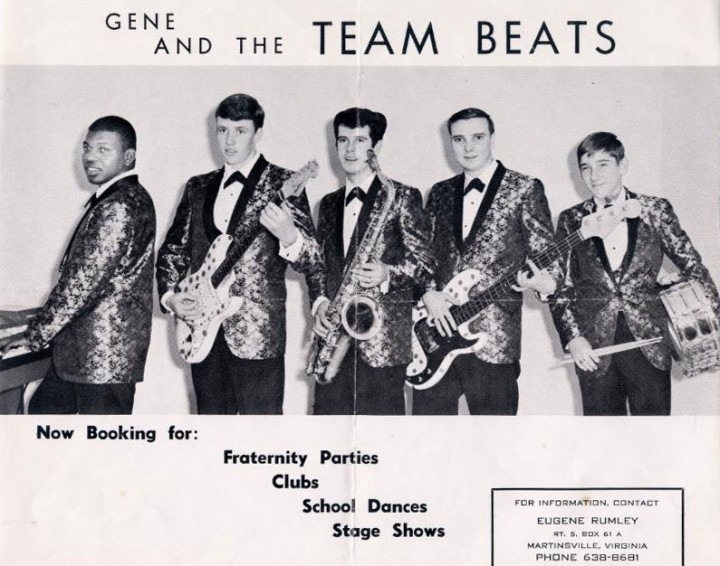
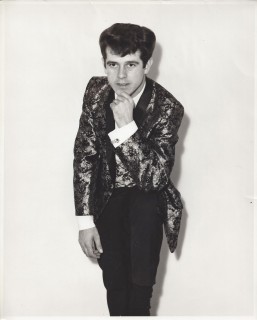
It has been nearly a half-century since five musicians from Martinsville and Danville banded together to form a group that would record just six sides over their decade together, but the music they created continues to gain fans and now reaches a far greater audience than was possible when they honed their skills in rural Virginia in the 1960s.
Gene and the Team Beats started their career as the Corvettes, an instrumental group led by Gene Rumley of Martinsville, who also played sax and booked the band throughout Virginia and the Carolinas. Carl Clarke (also from Martinsville) was the group’s original rhythm guitarist and joined the band near its inception in 1959. He remembers that the band originally performed as the Teen Beats, borrowing their name from a popular instrumental recorded by drummer Sandy Nelson. But when several of the members turned 20, Gene and the Team Beats were born.
The Team Beats performed mostly in Virginia, North and South Carolina and the DC area between 1959 and 1968. The band started recording late in their career, with all three 45s released between 1965 and ’67.
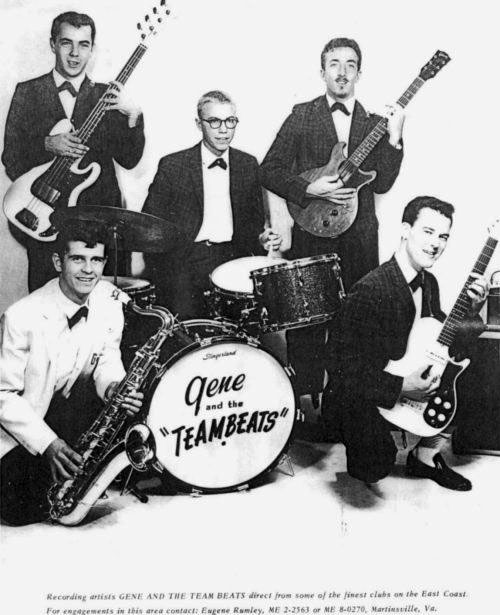
L-R: Butch Fox (bass); Dennis Porter (drums); Lewis Woodall Lead guitar); Carl Clark (rhythm guitar); Gene Rumley (sax)
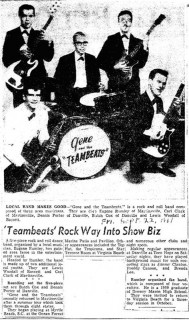
The Team Beats were especially popular in the Danville area and early performances saw the group backing recording artists Freddy “Boom Boom” Cannon, Brenda Lee and Jimmy Clanton at the local Coke plant. Clark recalls that the crowds were huge and even the local musicians were treated like rock stars. Butch Fox doubled on guitar and bass, while Dennis Porter played drums in the 1961 Team Beats’ configuration. Both commuted from Danville.
An article appearing in the Martinsville Bulletin in September 1961 recounts the band’s return from a summer tour which took them across eight states. They began playing in Myrtle Beach, S.C. at the Ocean Forest Marine Patio and Pavilion. Other appearances included the Top Hat, the Tropicana, and the Star Terrace Room in Virginia Beach.
Besides Rumley, bassist Carl Barrow had the longest history with the band, starting with the original line-up and continuing through countless personnel changes. Barrow’s bass can be heard on all three recording sessions. He first met Rumley when the future bandleader was “16 or 17 and he was working a night job as a curb hop at Sugar’s Drive-In, a small diner located in Martinsville on River Hill.” He remembers Gene had a strong work ethic and didn’t seem to mind holding down a full-time job, booking the band and driving the Team Beats to and from jobs in Virginia and the Carolinas.
But there were equipment problems early in their career, with Barrow blowing speakers at performances. He went to work with Clark and the pair designed their own cabinet. They mounted two 15 inch JBL speakers in a huge cabinet powered by a Fender amp. Other bands heard about the innovation and were coming to hear this “loud and very deep bass amplifier.” The huge tower was years ahead of the Marshall stacks of the sixties and even had a practical application, providing the band a safe hiding place when fights and gunfire cleared the dance floor.
Clark and Barrow’s paths first crossed when they attended separate high schools in Martinsville. Barrow remembers being blown away at an assembly at Drewry Mason High School when Clark took the stage playing guitar. This was before the Team Beats, but “Carl got them reelin’ and rockin’ with a Chuck Berry song; he could really play.”
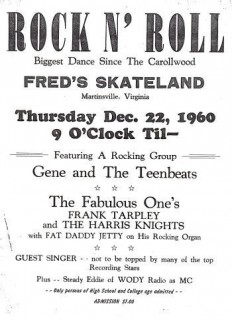
In the summer of 1961, the Team Beats were playing a night club in Norfolk — the Star Terrace Lounge — and living in a motel near Virginia Beach. With all of clubs booked at the beach, the band had to make do with the steady job in Norfolk. Clark recalls that “after a month or two some shyster talked us into going to Chicago, explaining that he had worked up a job for us there and we would be famous.”
All five members crammed into Rumley’s vintage Oldsmobile, pulling a wooden trailer covered with a tarp to the Windy City. On arrival, they discovered that the club manager had never heard of the band and had no interest in booking an unknown group from Virginia. Clark explains that “you had to be 21 to walk into the place, much less work there. We had been had by a manager who wanted us to leave (Norfolk) so his group could move in.”
The group piled back into Gene’s Olds and were trying to find their way out of Chicago when they “found this nice quiet road with no traffic.” With no place to stay and a long drive home, the band found a secluded spot by the water and went to sleep. The next morning they were preparing to leave but couldn’t understand why so many people were walking in the “road” and looking at them like they were from another planet. The band stopped the car and got out, only to be greeted by sirens and police cruisers coming through the woods in their direction. Gene and his compatriots were soon surrounded by the law. With guns drawn, they ordered the band to spread eagle and were promptly searched. Unbeknownst to the Team Beats, they had been driving on the sidewalks of Lake Shore Park.
The group was ordered to remove everything from the band trailer and all of their instrument cases were searched. With no machine guns in tow, Chicago’s finest finally realized that they weren’t dealing with criminals but “five dumb, redneck hillbillies from Virginia trying to become rock and roll stars.” They repacked their equipment and were escorted from the city by one of the officers. When they arrived at the outskirts of town, the cruiser stopped and the cop told them to “head that Oldsmobile south and don’t look back.”
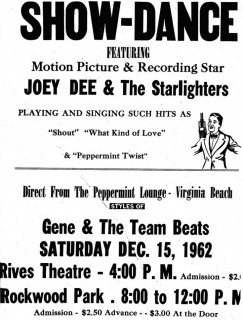
Clark married in 1963 and “found a shift job,” which didn’t jive with the night life and long hours required for road gigs on weekends. He left the band and music shortly thereafter but still plays, although he has switched to bass and Bluegrass music.
Lewis “Lew” Woodall of Bassett was the band’s original lead guitarist, and still performs with his own jazz quartet. He recalls the early years, when the band formed in 1959-60 as Gene and the Teen Beats. He says the band played about every weekend around Martinsville, Danville and Roanoke, frequently crossing the state border to play jobs for college fraternities. Woodall says in addition to the extended engagement at Norfolk’s Star Terrace, the Team Beats also played Virginia Beach’s Top Hat Club in the summer of 1961.
Woodall’s instrumental prowess was already legendary in Southside Virginia and Barrow says he had no rivals, calling him “the best guitarist anywhere around” and “way ahead of his time.” Barrow recalls that “Lew was getting sounds out of just his straight guitar without the fuzz box and pedals that came along years later.”
While the band was small in number, they were able to get a full sound because each member was an accomplished musician. They were primarily a soul and rhythm and blues band and Rumley points out that “Lewis (Woodall) and some of the guys hated playing rock and roll.”
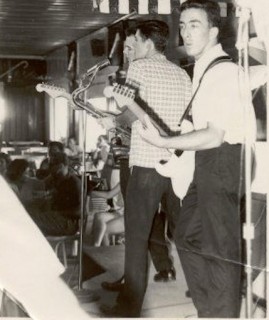
Gene and the Team Beats were the house band at the Peppermint Beach Club in Virginia Beach for the summer in 1962. The club was the sister of the renowned Peppermint Lounge in New York City and home of Joey Dee and the Starlighters of “Peppermint Twist” fame. The Team Beats played to a packed house during their two-month stint at the club. Between frat house engagements found by Rumley (aided by Bill Buckner) and the jobs secured by the group’s three booking agencies, there was seldom a weekend when the group wasn’t on the road.
One such weekend found the Team Beats in Greensboro in the dead of winter. Rumley drove the group’s blue Econovan, pulling a band trailer with the guys crammed inside the van. Barrow admits “it wasn’t highfalutin; we were lucky to get there at times.” The band finished their job about 1 a.m., loaded the trailer and Gene got behind the wheel. He was also working a day job for Gerber Foods at the time, so Rumley was tired. Barrow recalls that it was bitterly cold outside “and Gene was so sleepy that he would roll the window down and stick his head outside until he nearly froze. That would wake him up for a few minutes and when he was about to doze off, he’d do it again.” Barrow suggested that “maybe one of us should drive,” but Rumley would have none of it. They made it home safely but Barrow marvels that “we weren’t all hurt or worse.”
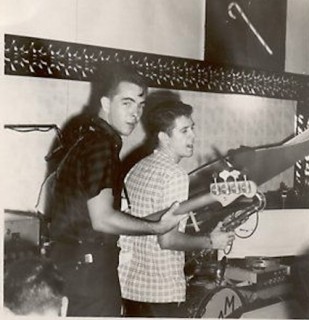
Wayne Motley was the band’s vocalist during this period. Rumley describes Motley as “an amazing showman and singer,” but with a troubled life that made him “hard to manage at times.” Motley, who also played guitar, keyboards and “just about anything but a horn,” was in and out of the band. Rumley explains that he “had to let him go a couple times (but) took Wayne back out of desperation.” He finally left the band for good after a minor scrape with the law.
Motley was fronting the group when the Team Beats won second place in a statewide battle of the bands competition in Richmond. Dressed in matching outfits and belting out a Jackie Wilson tune, the band took home $250 and new suits for each member.
Motley was already a veteran of the band scene by this time, starting at age 14 as a founding member of the Royal Kings, which played the club and college circuit in the Virginia Beach/Ocean View area. He would return to the Royal Teens after his ouster from the Team Beats. Barrow recalls seeing the band in Roanoke then and not recognizing Motley immediately because he was wearing a blonde wig.
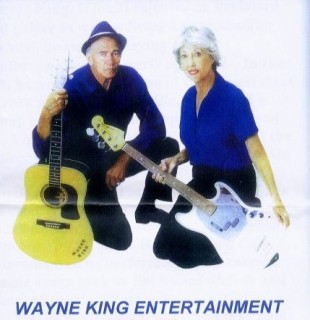
In later years, Motley recorded and performed with his wife, Katherine, in the Newport News area as Wayne “King” Motley. His three-hour show was interspersed with vintage rock and roll, country classics and an Elvis tribute. He continued entertaining at assisted living and retirement communities until just before his death at age 67. Barrow, Buckner and Lew Woodall visited Motley at his home a month before he died on August 18, 2012. Barrow says he was in good spirits and glad to see all of them after so many years. Bill Buckner, who was instrumental in promoting the band, died months later on April 2, 2014. He was 76.
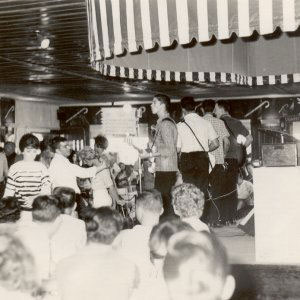
Lew Woodall remembers that in 1963, the band played a couple of months at the Twist Lounge at Nags Head. Nights found the band sleeping in a hot dog stand on the beach, with all five members crammed into a small cinderblock room and sharing a single sheet. Rumley recalls that “one night the guys left the sheet for me, but they’d wrapped it around a dead shark.” While the stand had “gone broke and closed,” the awning was still up and band members would be awakened by beachcombers who wanted a snack in the middle of the night.
Woodall left the Team Beats at the end of that summer when he transferred to Virginia Commonwealth University in Richmond. After graduating in 1965, Woodall was drafted and his brother, Lonnie, began playing with Rumley while Lew was in Vietnam.
The younger Woodall and Barrow shared an affinity for the same music and he recalls “Lonnie and I used to do a little soulful singing to each other.” The two were like brothers and Lonnie was already a regular on the bandstand, tagging along when Lewis was playing with the group. Lonnie picked up the guitar and “after a while we could see he was going to be a great guitarist. He joined the band and Lonnie took over where Lew left off.”
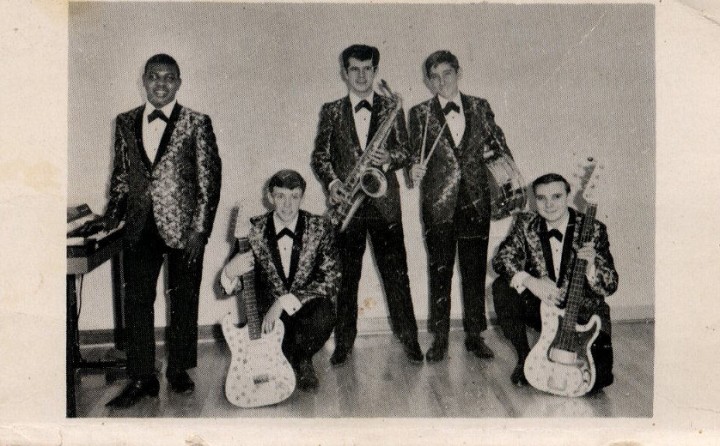
L-R: Charles Hairston, Lonnie Woodall, Gene Rumley, Rickie Fox, Brian Thomason
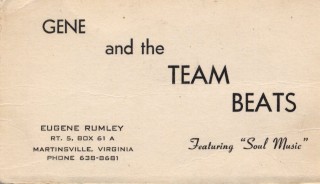 With Motley’s forced exodus from the band, Rumley was in need of a soulful vocalist. He found Charles Hairston by sheer tenacity, explaining that he went up Fayette Street in Martinsville saying: “Hey, we’re looking for a black singer to really represent our group with soul music… who’s a good singer?” Someone recommended Charles, who passed the audition and became the voice of the Team Beats. Gene says his contribution cannot be overlooked, and believes “Charles really made our band at that time.”
With Motley’s forced exodus from the band, Rumley was in need of a soulful vocalist. He found Charles Hairston by sheer tenacity, explaining that he went up Fayette Street in Martinsville saying: “Hey, we’re looking for a black singer to really represent our group with soul music… who’s a good singer?” Someone recommended Charles, who passed the audition and became the voice of the Team Beats. Gene says his contribution cannot be overlooked, and believes “Charles really made our band at that time.”
The addition brought some problems in the segregated South, where the band was refused service at a restaurant while returning from a fraternity gig at the University of Virginia. But having Hairston on vocals also allowed the Team Beats to play in some black clubs that were generally off limits to white bands.
There were some close calls, though. On one occasion the band was playing in the basement of an all black club in Martinsville when a woman accused her boyfriend of cheating and pulled a Saturday night special from her purse. She pointed the gun at the boyfriend and shouted: “I’m gonna blow your head off!” He ran into the women’s bathroom as the band scurried for cover, ducking behind the piano and amplifiers. With a staircase on each side of the bandstand, the patrons ran up the steps to the right as the irate female continued to wave her pistol in the other stairwell. The band had nowhere to go and remained in hiding until the standoff could be diffused.
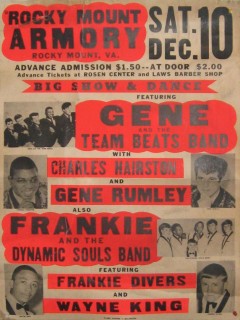
Rumley recalls another incident at a long since forgotten club “somewhere back in the sticks” of North Carolina. After agreeing to take the job, Rumley was contacted by Bill Buckner, who wanted to book the band for the same date. When Buckner learned where the Team Beats were scheduled to perform, he warned the bandleader that they were risking life and limb by playing there. But the gig paid about $300 and the band needed the money, so Rumley instructed Buckner to keep quiet about his reservations.
Rumley didn’t tell the band about the club’s reputation for violence, but instructed the guys to pull the old, upright piano away from the wall, in case they had to duck for cover. With just one door on the opposite end of the dance hall, he also made certain the window behind the bandstand was open, in case they had to stage a speedy exit.
The band was rocking about 1 a.m. when two gunshots rang out. That brought things to a standstill, but the partying resumed once the patrons realized the shots had come from the parking lot.
As the band was packing up for the night, Rumley inquired about the gunshots and learned that a woman had fatally shot her boyfriend.
The band was instructed to pick up their pay at another location. Rumley was returning to the van with the night’s receipts when he spotted a drunk standing by the van, talking to the musicians about the shooting that had happened a couple of hours earlier. Turns out he was also the local undertaker and, upon determining that the shooting victim had died, simply placed him on the back seat of his car and returned to the festivities. When the band declined his offer to view the body, the mortician drove on to the morgue. It would be the first — and last — time the Team Beats booked a job there.
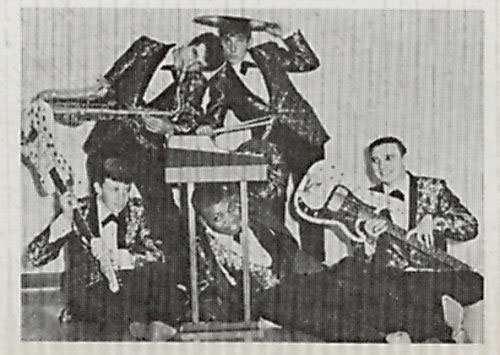 Musician and composer Rickie Fox was also an early member of the band and says one of his first performances as a Team Beat was at the Rathskeller, a downtown Danville nightclub located off Main Street, behind the Elk’s Lodge. Fox explains that his brother, Butch, got him into the group after one of the members (he’s not sure which) was drafted into the Army. Butch Fox switched to lead guitar and 12-year-old Rickie picked up the bass. Fox ended up playing with the group for about two-and-a-half years, first on bass, later on guitar and finally on drums. His drumming can be heard on the band’s first two records.
Musician and composer Rickie Fox was also an early member of the band and says one of his first performances as a Team Beat was at the Rathskeller, a downtown Danville nightclub located off Main Street, behind the Elk’s Lodge. Fox explains that his brother, Butch, got him into the group after one of the members (he’s not sure which) was drafted into the Army. Butch Fox switched to lead guitar and 12-year-old Rickie picked up the bass. Fox ended up playing with the group for about two-and-a-half years, first on bass, later on guitar and finally on drums. His drumming can be heard on the band’s first two records.
Butch was asked to leave the band after missing several rehearsals. Rickie was not yet old enough to drive and had no way to get to Martinsville “so Gene hired Brian Thomason to play bass” and bring the younger brother to rehearsals. Fox switched to guitar; Lew Woodall was drafted and Rumley hired his brother, Lonnie, to play guitar with Fox. Charles Hairston was the vocalist, Mickey Walker played drums and Rumley was on sax.
Fox shifted to drums when Walker was drafted and recalls driving to Sam Ash Music in New York, “where I bought a set of drums just like Ringo’s: black pearl Ludwig’s.”
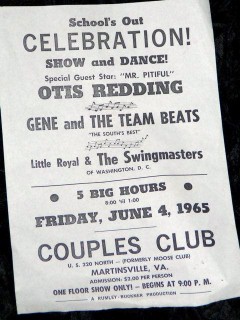
Fox says his most vivid memory is playing with Otis Redding in Martinsville on Friday, June 4, 1965. Fox recalls that Redding, then billed as “Mr. Pitiful,” was playing at the June German Ball, which was being held on Fayette Street in Martinsville. The “School’s Out Celebration Show and Dance” was billed as a five-hour show featuring Redding, with Little Royal and the Swingmasters of Washington, D.C. and Gene and the Team Beats as support acts. Fox says that Rumley and friend Bill Buckner had arranged for Redding to play for about an hour, with all of the bands using the Team Beats’ equipment “because they just kind of came in and then they went out.” According to Fox, the Team Beats were playing a club on 220 at the time and both he and Lonnie Woodall worshiped Little Royal’s guitar player, Robert Parker, stealing “every guitar lick we possibly could from him.” Little Royal was also quite a showman and emulated James Brown.
The Otis Redding show was at Baldwin’s Gymtorium on Fayette Street and attracted 3,000 fans. Rumley says the aging, two-story building had a balcony that circled the interior, with a high stage and a large dance floor. The Team Beats got the crowd warmed up and by the time they left the stage, “that place was jumping and the old wooden building was literally shaking.” He says when Otis Redding performed, the sound was “absolutely unbelievable.” Rumley recalls that the horn section from James Brown’s band had just defected to the “up and coming” Redding and says “they basically tore the roof off the place. That was one of the best jobs that we’d ever played.”
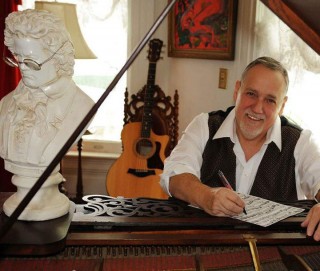
Fox was also with the band when the Team Beats opened for the Shangri Las at the Danville City Auditorium. The all-girl group was backed by a stellar English instrumental band, Sounds Inc. The group had recently performed with the Beatles and — like the Liverpudlians — honed their skills at the famed Star Club in Germany.
The agent for the show arranged for the Team Beats to travel to Washington, D.C. to play for other booking agencies. Fox remembers that they played a club with Little Willie and the Hand Jives. And while nothing ever came of the audition, Fox says they had a great time there.
The Team Beats performed with Sam and Dave, Percy Sledge and the Showmen. They also provided instrumental backing for Joe Simon, Inez Foxx, William Bell, the Kelly Brothers and Freddy Cannon.
Eddie Scott, who played drums after Fox left the group, says the show with Sam and Dave was especially memorable, since the Team Beats had the chance to join the duo’s huge band on stage. Scott remembers that the Team Beats “were the opening act (but) as the night wound down, we were able to play together, all of us. Sam and Dave and their group (were) on stage and then Gene and the Team Beats along with them… we were able to deliver a high powered performance.”
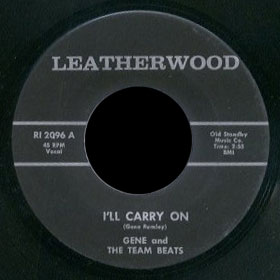 The Team Beat’s first single, “I’ll Carry On” b/w “Apple Fuzz” was released on Leatherwood (RI 2096) in 1965. Rickie Fox played drums on the session and says the band recorded the 45 not long after he joined.
The Team Beat’s first single, “I’ll Carry On” b/w “Apple Fuzz” was released on Leatherwood (RI 2096) in 1965. Rickie Fox played drums on the session and says the band recorded the 45 not long after he joined.
“I’ll Carry On” is credited to Rumley, while bothers Lewis and Lonnie Woodall are listed as composers of the instrumental, “Apple Fuzz,” which features nice jazz phrasing on guitar.
Rumley explains that for the first release, the band saved some money “from a couple of gigs, rented a studio near Rocky Mount somewhere and cut our first record, which we self-promoted.” Rumley describes the recording quality as “bad,” noting “there wasn’t much separation at all… probably one, two tracks because we were playing like we were playing in a nightclub and had the volume cranked up. When the sound came out, we were not too happy with it.” The single is distorted and poorly mixed and received little airplay.
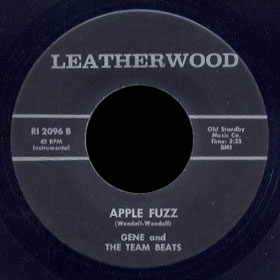 Fox insists it wasn’t recorded in a studio at all, but rather in the basement of a home in Rocky Mount. He was 12 at the time but remembers the night vividly. Fox says the band had played a job in Roanoke at the Sportsmen Club and “Gene had hooked up with some guy that had a quote-unquote ‘studio’ in his basement.” That night after the gig, the band went to his home and recorded “I’ll Carry On” and the flip side in a marathon session. Fox says the band was “literally there pretty much through the night.” While he knew little about recording studios at the time, Fox remembers “it was kind of primitive (and) I don’t think we did a lot of overdubbing or anything like that. It seemed like it was just a situation to record right onto a big reel-to-reel.”
Fox insists it wasn’t recorded in a studio at all, but rather in the basement of a home in Rocky Mount. He was 12 at the time but remembers the night vividly. Fox says the band had played a job in Roanoke at the Sportsmen Club and “Gene had hooked up with some guy that had a quote-unquote ‘studio’ in his basement.” That night after the gig, the band went to his home and recorded “I’ll Carry On” and the flip side in a marathon session. Fox says the band was “literally there pretty much through the night.” While he knew little about recording studios at the time, Fox remembers “it was kind of primitive (and) I don’t think we did a lot of overdubbing or anything like that. It seemed like it was just a situation to record right onto a big reel-to-reel.”
He says the setting looked nothing like a studio. Fox had just started playing the drums and when he listens to the 45 today, “I cringe because everything I like in a drummer now I didn’t do then; I was playing everything on the off beat… a lot of off beat snare drum hits and the ride cymbal was real heavy.” But he feels justified in that the record was “hastily done in somebody’s basement and there’s no telling what type of equipment he had.”
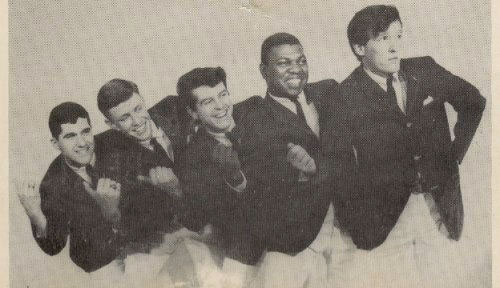
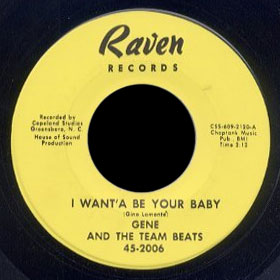 “I Wanta Be Your Baby,” and “I’ll Let Nothing Separate Me” were the group’s second and third 45 releases, respectively. Both were pressed in Tennessee by Nashville Record Productions, Inc. for Raven Records in Danville, although “I Wanta Be Your Baby” was actually recorded at Copeland Studios in Greensboro, N.C. Rumley doesn’t recall why they opted to record the single there, but believes it was because Copeland had better equipment than the fledgling House of Sound Studios on Old Piney Forest Road in Danville.
“I Wanta Be Your Baby,” and “I’ll Let Nothing Separate Me” were the group’s second and third 45 releases, respectively. Both were pressed in Tennessee by Nashville Record Productions, Inc. for Raven Records in Danville, although “I Wanta Be Your Baby” was actually recorded at Copeland Studios in Greensboro, N.C. Rumley doesn’t recall why they opted to record the single there, but believes it was because Copeland had better equipment than the fledgling House of Sound Studios on Old Piney Forest Road in Danville.
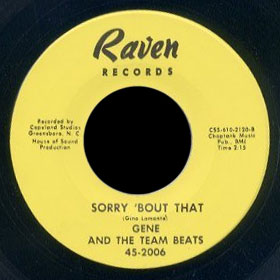 “I Wanta Be Your Baby” b/w “Sorry ‘bout That” was released in 1966 and was the first rock record in the Raven Records (Raven 45-2006) catalog and was among the label’s first releases. Writing credits for both sides are given to Gino Lamonte, although the Italian never existed. Rumley explains that he penned both sides; however, the band decided to create a composer pseudonym because they thought a European name would look more impressive on the label.
“I Wanta Be Your Baby” b/w “Sorry ‘bout That” was released in 1966 and was the first rock record in the Raven Records (Raven 45-2006) catalog and was among the label’s first releases. Writing credits for both sides are given to Gino Lamonte, although the Italian never existed. Rumley explains that he penned both sides; however, the band decided to create a composer pseudonym because they thought a European name would look more impressive on the label.
This was to be Fox’s swansong with the band and he recalls that Frank Koger, who ran the House of Sound and Raven Records, accompanied the band to Greensboro, along with Koger’s close friend Bill Buckner, who was managing the Leeds Music Store in Collinsville at that time. Fox remembers “it was the first time I’d ever gone to a real studio and the guy came running out and oiled my (squeaking) bass drum pedal and I was like: ‘Hey, what are you doing?’ I didn’t quite get it.”
The band was well prepared to lay down the plug side, but Fox recalls that the B-side was another matter, adding that the band would always make up something for the second side. “We would go to the studio with one song, which looking back on it is not very smart, and then we would just kind of make up something to go on the other side right there in the studio,” said Fox. The flip side was usually an instrumental, because the group didn’t have time to write lyrics. “And that’s how we made up that “Sorry ‘bout That,” which he says was created on the spot in the studio. Buckner laughs on the track and Koger can be heard saying “Sorry ‘bout That” at the end. Fox was in seventh grade at the time but still remembers the excitement of recording in an actual studio setting.
The personnel on “I Wanta Be Your Baby” is: Gene Rumley (sax and backup vocals); Charles Hairston (lead vocal); Lonnie Woodall (guitar and backup vocals); Rickie Fox (drums); Carl Barrow (bass).

In addition to Rumley and Buckner, the Team Beats had three agencies booking the band: Hit Attractions out of Charlotte, N.C.; Cavalier Attractions in Charlottesville, VA; and Southeastern Artists and Promotions of Florence, AL.
As he was too young to drive, Fox recalls that “when my ride (Brian Thomason) left the band, I had to leave, too.” He went on to form the Soulmasters with musicians from Danville and Eden, N.C. He played drums in the early Soulmasters, with Thomason on bass. Fox also played in the Majors, City Council, the Manchesters and Fox and Company. He continues to record, produce and perform today, both as a solo artist and with various bands.
To “promote” the record Rumley and the band’s drummer got in Gene’s car “and drove for two days from Danville to Richmond, up to a guy playing all kind of rhythm and blues out in Delaware. Just anybody who would listen to us we go into a studio and try and tell them who we were and what we were doing.” Apparently it worked, as “I Wanta Be Your Baby” was a regional hit and the group’s best selling 45. Bassist Alan Rowe remembers buying his copy at Leeds Music Center in Danville from Soulmaster Doug Hyler, who worked at the store when not on the road with his band.
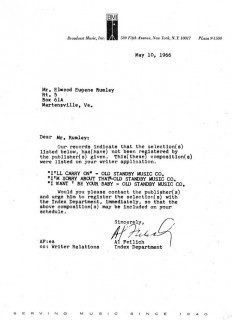
A letter from Broadcast Music, Inc. to Rumley dated May 10, 1966 lists the A-sides of both singles and “I’m Sorry About That,” urging Rumley to notify the publisher (Old Standby Music Co.) and have the songs registered with BMI as soon as possible. His experience was not unique. Two other Raven bands, Lost Soul and the Individuals, thought their songs had been registered, only to learn years later that the music licensing firm had no record of their recordings. Individuals’ bassist Tommy Redd kept the paperwork showing he paid Koger $6 to register two of his songs with BMI.
Interestingly, Koger recycled the single’s flip side without telling the band. “Sorry ‘bout That” can be heard as the instrumental backing to an otherwise forgettable B-side recitation (“I’m Fine”) recorded by Charlie Chandler (Raven HOS-45-2042 “The Drunken Driver” b/w “I’m Fine”) and released on Raven’s C&W subsidiary.
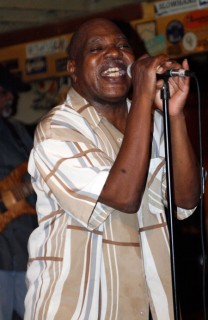
Most regard the Hairston line-up as the band’s best. Hairston would remain with the Team Beats until his conscription to military service. He would later be reunited with Fox in City Council, a horn band that toured extensively, performing original material and covers of popular songs that were given the band’s unique stamp through creative arrangements.
Hairston moved to North Carolina in the mid-70s. He remained a fixture on the Charlotte music scene until his death from prostate cancer in 2009 at the age of 61. As vocalist, he fronted the All Stars and is best remembered for being “the soul and energy” of the band’s Monday night performances at the Double Door Inn.
Hairston put on a memorable show for the Inn’s 35th anniversary in December 2008, just two months before his death. Fans say he was his usual self, sweating, singing and moving all around the stage. He last performed publicly at the Double Door in January 2009. By then the cancer he’d battled all year had taken its toll and he sang while sitting on a stool. Hairston’s mother and family visited from Maryland about a week before his death and he sang for them and the hospice staff. He was in good spirits and one in attendance described it as “a wonderful moment… and then he passed peacefully.” The Charles Hairston Memorial Foundation was established the following year.
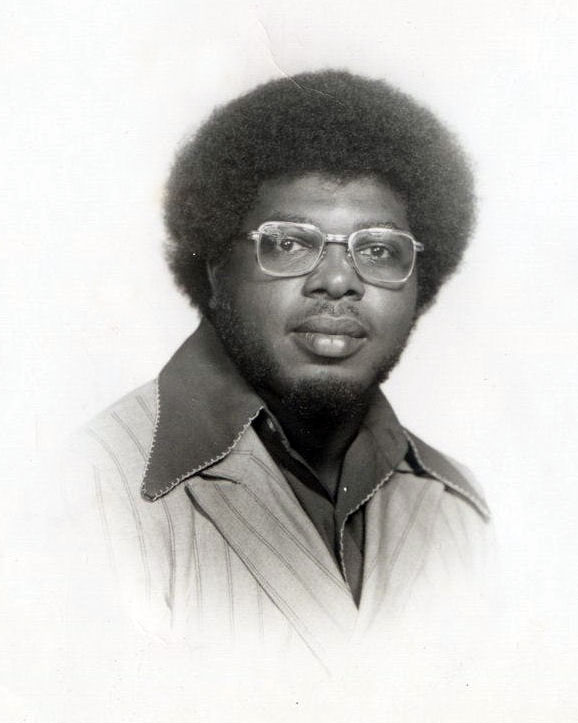
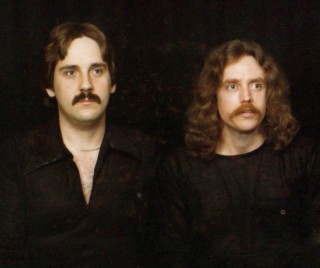
Guitarist Lonnie Woodall also died too soon, suffering a fatal heart attack on May 20, 2002. He was 54 and had recently attended a bands reunion in Danville that included many veterans of the Team Beats. He played with numerous local and national groups, including City Council, the Rogues, Fox and Company, Percy Sledge and the Blues Defenders. He was the owner of Woodall’s Music and was also instrumental in establishing Harrison Scales Young Musicians Foundation and worked closely with the Bassett High School Jazz Band.
Woodall is still remembered as a great guitarist and a soulful blues singer, but also as a friend to all. Barrow calls him his “brother” and Rumley said he was “always dependable, up-beat and loved music.” Gene says there were many times when he considered quitting, but “I could always depend on Lonnie being there when we had to start over with new people in the group: singers, bass players or drummers. I don’t know of anyone who did not like Lonnie; he was always learning, always caring and kind to everyone he met.”
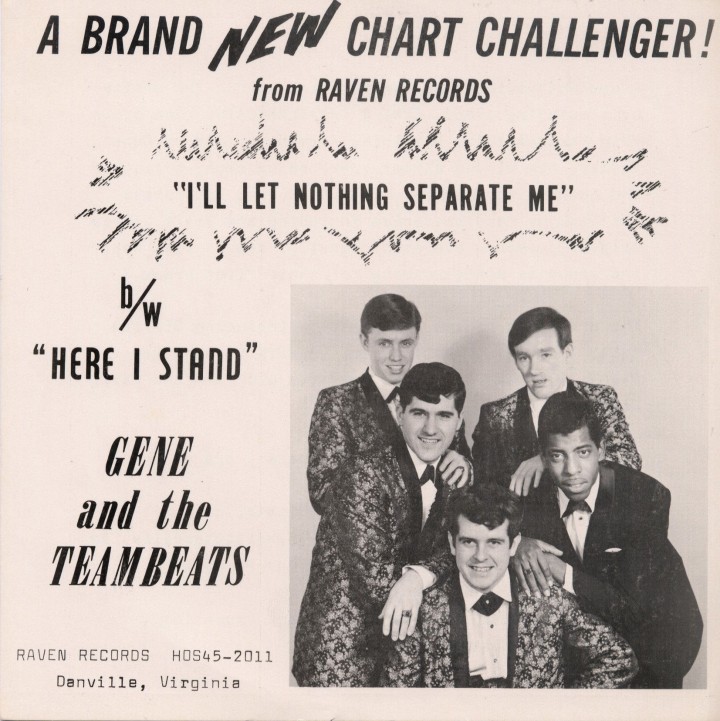
L-R: Lonnie Woodall, Carl Barrow, Gene Rumley, Eddie Scott, Jimmy Mitchell
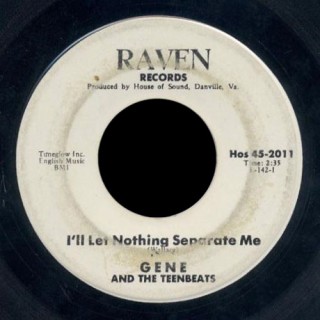 The band’s third and final release, “I’ll Let Nothing Separate Me” b/w “Here I Stand” (Raven HOS 42-2011) came out in 1967 and features a cover of an obscure song by the Wallace Brothers as its A-side. Early pressings featured a photo card insert of the band with a brief bio and booking information.
The band’s third and final release, “I’ll Let Nothing Separate Me” b/w “Here I Stand” (Raven HOS 42-2011) came out in 1967 and features a cover of an obscure song by the Wallace Brothers as its A-side. Early pressings featured a photo card insert of the band with a brief bio and booking information.
Since they were no longer writing their own material, Rumley explains that the members would “sit down and listen to old records,” then decide which tunes would be suitable for the group.” This time the group delivered what is arguably their best effort. And, unlike their previous releases, the B-side was no throwaway. “Here I Stand” stands on its own and is preferred by many to the single’s infectious plug side.
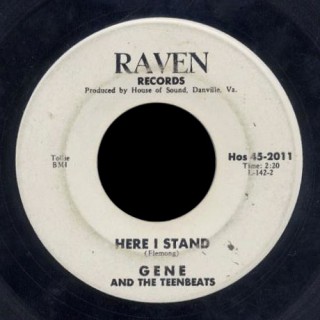 Hairston had been drafted and Rumley hastily recruited Martinsville’s Jimmy Mitchell as vocalist for the recording session, which also features Eddie Scott on drums. While Scott only appears on their last 45, he replaced Fox in 1966 and was with the Team Beats until the band called it a day two years later. He recalls passing an audition and recording at House of Sound Studios. Scott says the studio was small and there was very little overdubbing. As he remembers, “it was more or less cubicles and everything was recorded together… pretty much live to tape.” Mitchell sang lead, Rumley played sax, Lonnie Woodall was on guitar and Carl Barrow handled bass on the sessions.
Hairston had been drafted and Rumley hastily recruited Martinsville’s Jimmy Mitchell as vocalist for the recording session, which also features Eddie Scott on drums. While Scott only appears on their last 45, he replaced Fox in 1966 and was with the Team Beats until the band called it a day two years later. He recalls passing an audition and recording at House of Sound Studios. Scott says the studio was small and there was very little overdubbing. As he remembers, “it was more or less cubicles and everything was recorded together… pretty much live to tape.” Mitchell sang lead, Rumley played sax, Lonnie Woodall was on guitar and Carl Barrow handled bass on the sessions.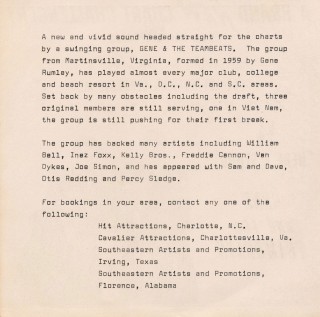
Mitchell was needed because “when Charles left we were missing that soul that only some people can bring to our style of music.” Rumley discovered Mitchell after again asking friends to recommend a good, soulful singer. He says Jimmy’s vocal styling fit the band perfectly. It didn’t hurt that he was a consummate “showman and front man.” By this point the band was moving in step on many of their numbers and Mitchell was a natural for the choreography, adding his own gyrations. Scott was also quite a dancer and Barrow recalls Eddie would hit the dance floor during breaks, “doing his best James Brown impression.”
Mitchell’s tenure with the band was brief. The singer married and left because it was too difficult to balance his day job with the band’s busy travel schedule. At some point he left Martinsville and Scott recalls that Mitchell later sang in clubs in New York City.
Barrow also left the band shortly before the break-up in 1968. Carl had been with the group on-and-off since he beginning but explains that he “went into commercial artwork” and the pressure of holding down a job and playing every weekend became too much.
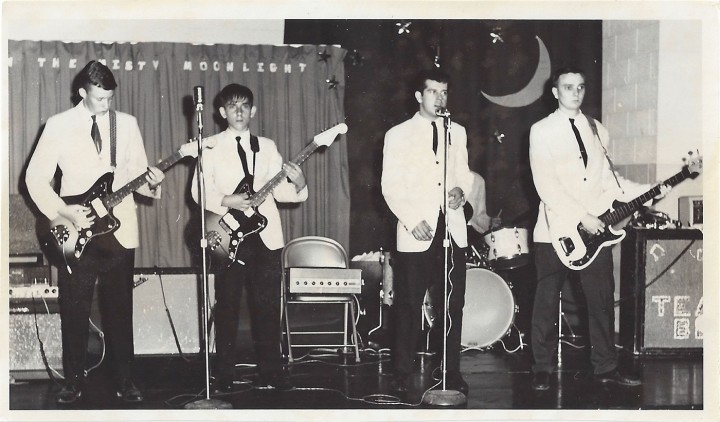
A fourth single release was planned and the backing track was recorded. The project was shelved after the group’s new lead singer, Alfonzo Martin of Martinsville, was also inducted into the military. Rumley regrets that the band was unable to add Martin’s vocals to their final recording session, describing his range as “unbelievable.” Martin served in the U.S. Army and rose to the rank of staff sergeant. He was killed by hostile fire in Vietnam.
The group disbanded shortly thereafter. Rumley points out that the band had been together nearly a decade and he had grown weary of replacing members who moved on to other bands, full-time jobs or were drafted and shipped out to Southeast Asia.
Scott moved to Myrtle Beach, South Carolina in 1996 and drove a truck until his retirement. He played in several bands over the years, including Martinsville’s Renegade Demolition Band in the eighties.
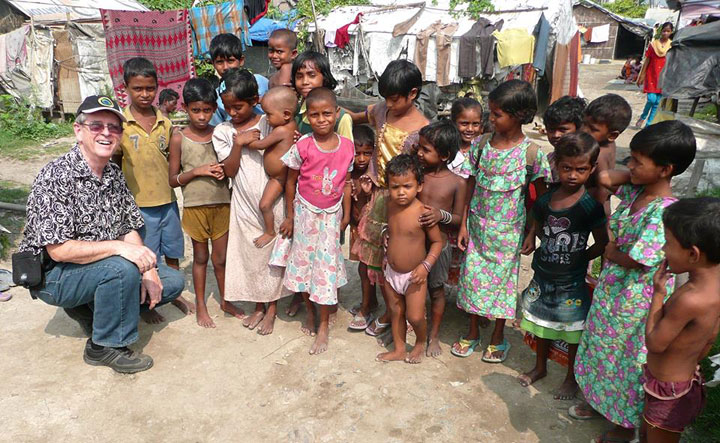
With the break-up, Rumley left touring behind and concentrated on a career. He spent more than 30 years in the business world, serving as president and vice president of multi-national corporations while leading training seminars throughout Asia-Pacific, Europe and North America. He was named “Business Man of the Year” by Alibaba.com, the world’s largest B2B search engine. While his home is in Florida, Rumley continues to travel extensively as a John Maxwell certified coach and teacher. But he is most passionate about his work with children in India, where he founded Mission for Orphans, a non-profit organization that helps feed, clothe and educate street children and orphans.
But rarely a day goes that he isn’t contacted by a follower of the music his band created nearly fifty years ago. The songs have stood the test of time, and Gene and the Team Beats live on through the dedication of Beach Music fans on the East Coast and lovers of Northern Soul in the United Kingdom.
Review: Dig That Underground Sound (Rhino Custom)
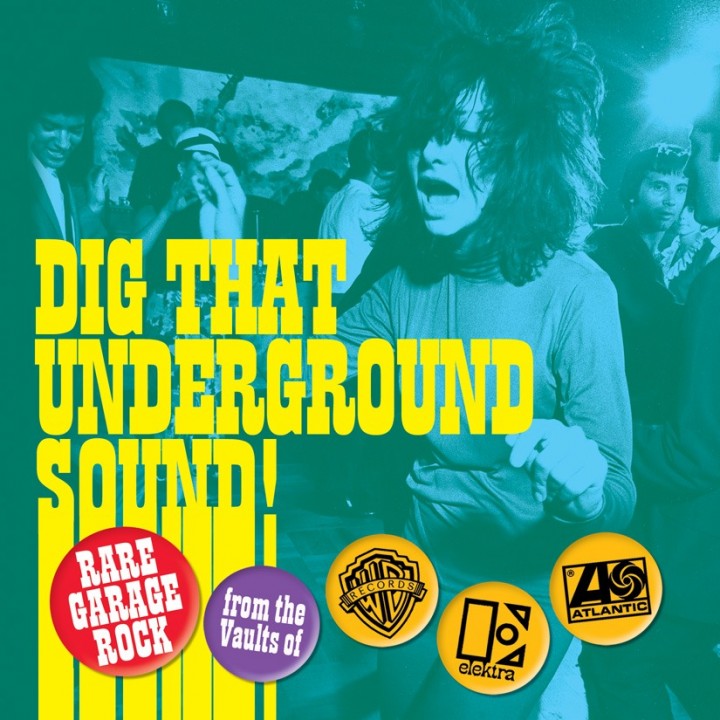
10 years ago Rhino released two fine 24-track CD compilations, Come to the Sunshine and Hallucinations, both subtitled “Nuggets from the WEA Vaults.” These compilations made thematic sense and included a lot of unfamiliar music. The sound was consistent as most of the songs came from the Warner Bros./Reprise labels, with a smattering from labels like Cotillion, Atco and Valiant.
I was hoping this approach would be repeated for this 3 CD set, Dig That Underground Sound! Rare Garage Rock from the Vaults of Warner Bros., Elektra & Atlantic Records. It’s a well-programmed selection of music, mixing familiar songs with the obscure, but that’s about the only thing I like about this release.
Unfortunately, there’s no unifying theme to this compilation. “Farmer John” follows “Black Roses”, and is followed by the Association. Most selections are singles, but then there are album cuts by the Fugs and Iron Butterfly. A few UK singles are mixed in, for no particular reason other than that they were released on Atco or Elektra. There are even a couple Flamin’ Groovies cuts from 1976, originally released on Sire!
Nor is there anything approaching ‘rare’ on this set. The only song that hasn’t already been reissued on CD is the Waphphle’s “I Want You”, which is hardly essential. There are no previously unreleased tracks. 13 tracks appeared on Rhino’s earlier CD set, Where The Action Is! Los Angeles Nuggets: 1965-1968 including the most inspired choices of obscure songs, such as “The Rebel Kind” by Dino, Desi & Billy, and “Come Alive” by the Things to Come.
A third of the selections come from the Warner Bros./Reprise labels, including oft-reissued fare by the Electric Prunes, the Music Machine and the Premiers. This set would have benefited from songs like the Magic Mushroom’s “I’m Gone”, the New Order’s “Why Can’t I” & “Meet Your Match”, and the Gates of Eden “Elegy”, all originally released on Warner Bros and never officially reissued.
Other than three songs from Love, Elektra is only represented by Leviathan’s “Remember the Times”, Clear Light and the Waphphle (the undeserving “I Want You” instead of the better “Goin’ Down”).
Atlantic/Atco provides the Vagrants (three songs), The Common Cold, Rose Garden, Iron Butterfly, and a couple UK artists: Vamp (“Floatin'”) and Sharon Tandy. The rest of the tracks are from other labels controlled by Warner Music Group, such as Dunwich, Mustang, Roulette, Mira, Original Sound, Autumn, many of which are good selections.
The sound quality is generally good but suffers on certain tracks, such as the Shadows of Knight’s “I’m Gonna Make You Mine” which is brittle and lacking in bass. The clipping was obvious when I opened the file up in an audio editor.
Other than a few nice Record Store Day 7″s, the Rhino Custom imprint seems to specialize in unexciting rehash of old music. The six page booklet has short bios on the three primary labels and ten of the bands. It’s a cheap package, but at 15 tracks per CD, it’s not even a bargain.
The 4 Dimensions
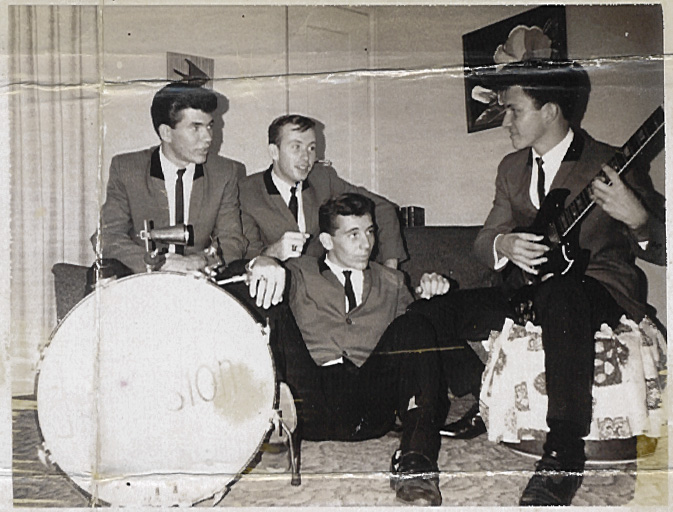
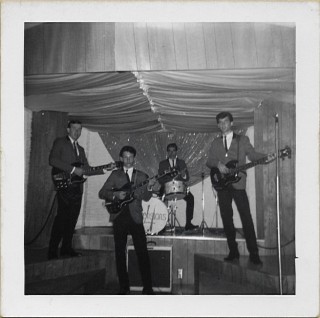 Frank Milone sent the photos and history of this North Miami band who unfortunately never recorded.
Frank Milone sent the photos and history of this North Miami band who unfortunately never recorded.
Frank Milone – lead guitar
Butch Cappolino – drums
Jim O’Connell – bass
Bob Wolfkill – rhythm
The 4-Dimensions were started 1963 in Miami Shores, Florida by three friends, Frank Milone, Butch Cappolino, and Jim O’Connell. Frank had been playing the guitar for several years, Butch had taken drum lessons and Jim volunteered to play bass.
They went through several lead guitar players when they met an older musician Buck Campbell. He trained Frank to play lead, Butch to play drums and Jim some bass. Once he had the band going with a list of top ten songs Buck moved on. The band auditioned several rhythm guitar players and found Bob Wolfkill who matched the temperament of the other three and fit right in.
The band started playing at many of the local schools and community clubs. Their first real big break came when they got a gig with local disk jockey Charlie Murdock. The band played every Friday night at the Cutler Ridge Mall south of Miami and eventually became the house band. They began playing all over the town and especially on Miami Beach. During the summer of 1964 they played in a small club call the Coffee House in Coral Gables where they played rock and roll music six nights a week.
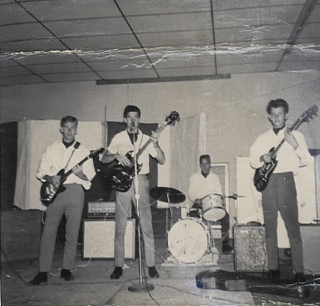 Near the end of 1964 they became one of the regular bands at the North Miami Armory on Sunday nights and at War Memorial Auditorium in Fort Lauderdale on Saturday nights. These were the top dance locations for teenagers on the weekends.
Near the end of 1964 they became one of the regular bands at the North Miami Armory on Sunday nights and at War Memorial Auditorium in Fort Lauderdale on Saturday nights. These were the top dance locations for teenagers on the weekends.
At the end of the summer of 1965 Bob left for college and the band disbanded. The band had a reunion in 1999 and jammed for the last time.
Frank is now currently playing in two separate bands.
Butch use to jam with Frank every once in a while and still had his original set of drums when he passed in 2008 at age 60.
Jim still has his original Gibson SG bass but does not play.
Bob sold his guitar to go to school when he left the band. All agreed it was the best time of their lives.
